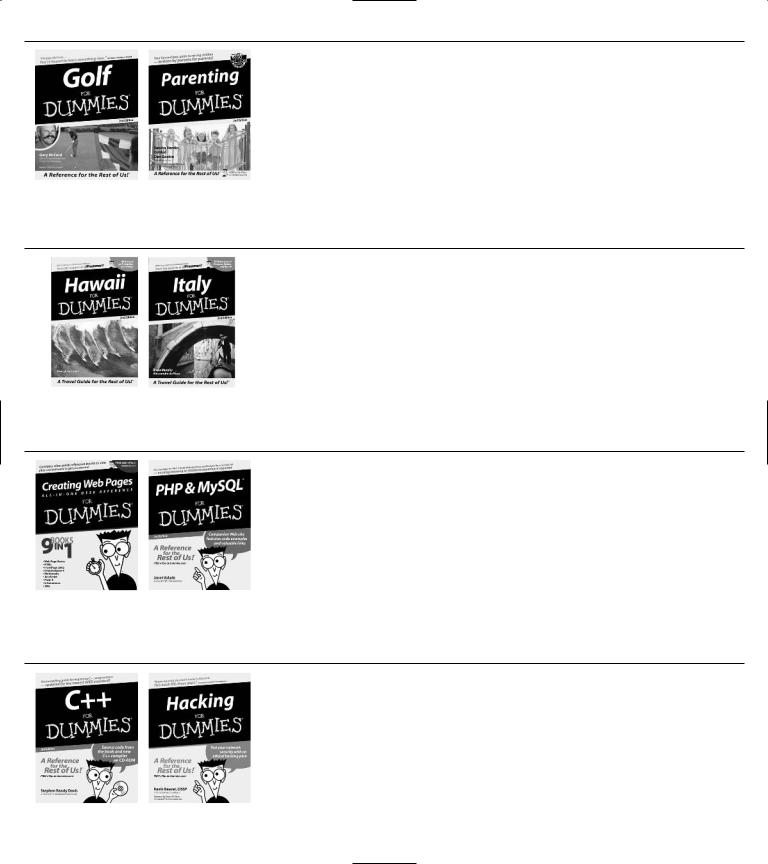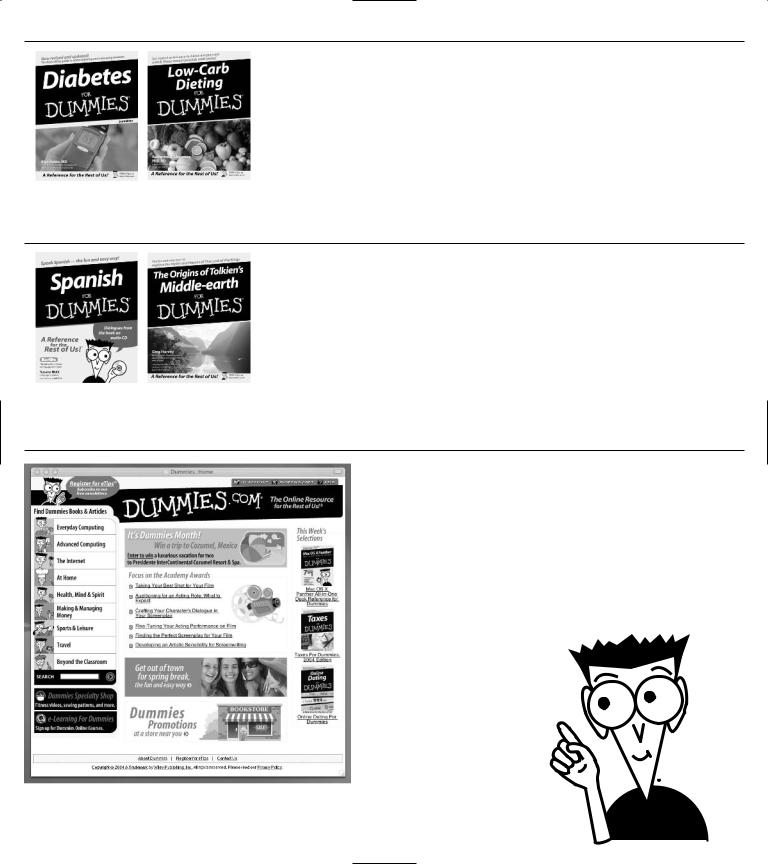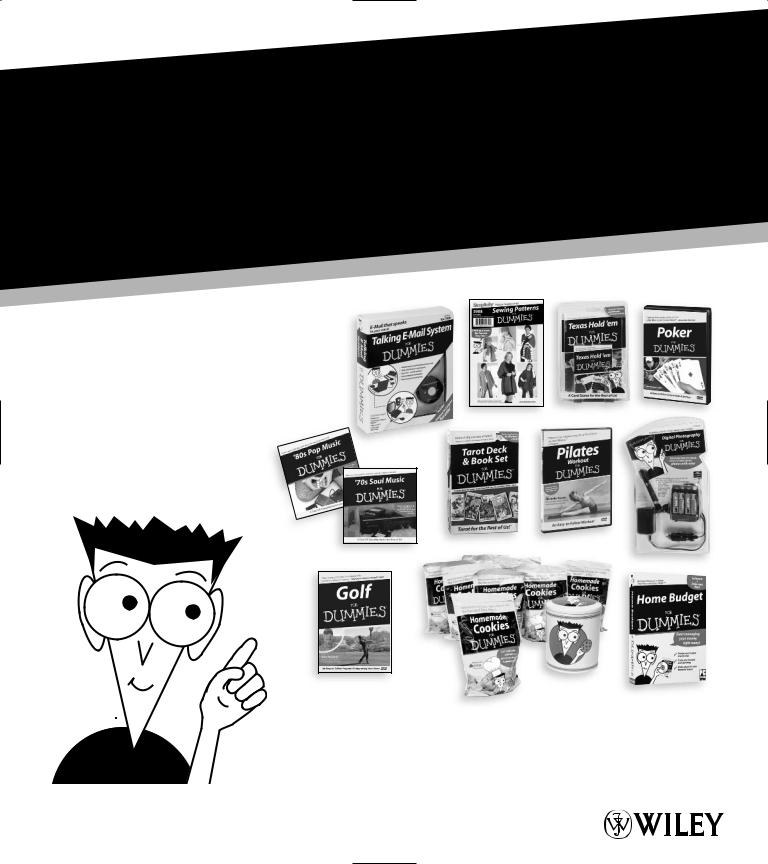
- •Introduction
- •Saving Time with This Book
- •Conventions Used in This Book
- •Part II: Working with the Pre-Processor
- •Part III: Types
- •Part IV: Classes
- •Part V: Arrays and Templates
- •Part VI: Input and Output
- •Part VII: Using the Built-in Functionality
- •Part VIII: Utilities
- •Part IX: Debugging C++ Applications
- •Part X: The Scary (or Fun!) Stuff
- •Icons Used in This Book
- •Creating and Implementing an Encapsulated Class
- •Creating a Mailing-List Application
- •Testing the Mailing-List Application
- •Customizing a Class with Polymorphism
- •Testing the Virtual Function Code
- •Why Do the Destructors Work?
- •Delayed Construction
- •The cDate Class
- •Testing the cDate Class
- •Creating the Header File
- •Testing the Header File
- •The Assert Problem
- •Fixing the Assert Problem
- •Using the const Construct
- •Identifying the Errors
- •Fixing the Errors
- •Fixing What Went Wrong with the Macro
- •Using Macros Appropriately
- •Using the sizeof Function
- •Evaluating the Results
- •Using sizeof with Pointers
- •Implementing the Range Class
- •Testing the Range Class
- •Creating the Matrix Class
- •Matrix Operations
- •Multiplying a Matrix by a Scalar Value
- •Multiplying a Matrix by Scalar Values, Take 2
- •Testing the Matrix Class
- •Implementing the Enumeration Class
- •Testing the Enumeration Class
- •Implementing Structures
- •Interpreting the Output
- •Defining Constants
- •Testing the Constant Application
- •Using the const Keyword
- •Illustrating Scope
- •Interpreting the Output
- •Using Casts
- •Addressing the Compiler Problems
- •Testing the Changes
- •Implementing Member-Function Pointers
- •Updating Your Code with Member-Function Pointers
- •Testing the Member Pointer Code
- •Customizing Functions We Wrote Ourselves
- •Testing the Default Code
- •Fixing the Problem
- •Testing the Complete Class
- •Implementing Virtual Inheritance
- •Correcting the Code
- •Rules for Creating Overloaded Operators
- •Using Conversion Operators
- •Using Overloaded Operators
- •Testing the MyString Class
- •Rules for Implementing new and delete Handlers
- •Overloading new and delete Handlers
- •Testing the Memory Allocation Tracker
- •Implementing Properties
- •Testing the Property Class
- •Implementing Data Validation with Classes
- •Testing Your SSN Validator Class
- •Creating the Date Class
- •Testing the Date Class
- •Some Final Thoughts on the Date Class
- •Creating a Factory Class
- •Testing the Factory
- •Enhancing the Manager Class
- •Implementing Mix-In Classes
- •Testing the Template Classes
- •Implementing Function Templates
- •Creating Method Templates
- •Using the Vector Class
- •Creating the String Array Class
- •Working with Vector Algorithms
- •Creating an Array of Heterogeneous Objects
- •Creating the Column Class
- •Creating the Row Class
- •Creating the Spreadsheet Class
- •Testing Your Spreadsheet
- •Working with Streams
- •Testing the File-Reading Code
- •Creating the Test File
- •Reading Delimited Files
- •Testing the Code
- •Creating the XML Writer
- •Testing the XML Writer
- •Creating the Configuration-File Class
- •Setting Up Your Test File
- •Building the Language Files
- •Creating an Input Text File
- •Reading the International File
- •Testing the String Reader
- •Creating a Translator Class
- •Testing the Translator Class
- •Creating a Virtual File Class
- •Testing the Virtual File Class
- •Using the auto_ptr Class
- •Creating a Memory Safe Buffer Class
- •Throwing and Logging Exceptions
- •Dealing with Unhandled Exceptions
- •Re-throwing Exceptions
- •Creating the Wildcard Matching Class
- •Testing the Wildcard Matching Class
- •Creating the URL Codec Class
- •Testing the URL Codec Class
- •Testing the Rot13 Algorithm
- •Testing the XOR Algorithm
- •Implementing the transform Function to Convert Strings
- •Testing the String Conversions
- •Implementing the Serialization Interface
- •Creating the Buffer Class
- •Testing the Buffer Class
- •Creating the Multiple-Search-Path Class
- •Testing the Multiple-Search-Path Class
- •Testing the Flow Trace System
- •The assert Macro
- •Logging
- •Testing the Logger Class
- •Design by Contract
- •Adding Logging to the Application
- •Making Functions Inline
- •Avoiding Temporary Objects
- •Passing Objects by Reference
- •Choosing Initialization Instead of Assignment
- •Learning How Code Operates
- •Testing the Properties Class
- •Creating the Locking Mechanism
- •Testing the Locking Mechanism
- •Testing the File-Guardian Class
- •Implementing the Complex Class
- •Creating the Conversion Code
- •Testing the Conversion Code
- •A Sample Program
- •Componentizing
- •Restructuring
- •Specialization
- •Index

Symbols and
Numerics
& (ampersand), encoding required for Web use, 337
* (asterisk)
with Match class, 333 as wildcard, 330, 333
#define statements
const statement compared to, 45
constants for directly replacing values, 77–78
using const instead of, 45–47 > (greater-than sign), encoding
required for Web use, 337 #include statements for header
files, 39, 40
< (less-than sign), encoding required for Web use, 337
% (percent sign) as wildcard, 331 + (plus operator), overloading,
120–122
+= (plus-equal operator), plus operator implementation and, 121
? (question mark)
with Match class, 333
as wildcard, 330–331, 333 32-bit operating systems, 54
A
abstraction
common base class for, 18 defined, 12
encapsulation for, 12
for extending functionality, 12–18
Index
mailing-list application example, 12–18
virtual methods and, 12 accessor functions or methods
making inline, 407–408 for MyString class, 123 AgeProperty class, 139–140
algorithms
choosing the most efficient, 350 Date class, 153, 154, 159 discrete pieces in classes
for, 159 encapsulating, 7–10, 36 for encryption, 343
for encryption method, encapsulating, 7–10
hiding from developers, 7–8 Rot13 encryption algorithm,
343, 344–346
STL advantages for, 200
for STL container classes, 200, 349–350
transform function, 349–353 updating encapsulated algo-
rithms, 10–11
vector algorithms, 200–203 for virtual files, 280, 290 XOR encryption algorithm,
343, 346–348
allocate method, overriding, 299, 300
American Heritage Dictionary, 12 ampersand (&), encoding
required for Web use, 337 anewfile.out file, 431 anoldfile.out file, 431 application development
breaking classes into discrete pieces, 159
breaking complex system into components, 217
building tracing into applications, 375–380
code updated by another source and, 7
configuration capability as hallmark, 251
creating general classes and, 175
eliminating the source of failures, 323
encapsulation and, 7–8, 11 enforcing return codes, 323–329 exception handling and, 319 exchanging data with Web-
based applications, 342 factory pattern for, 162 getting the design right, 440 hiding algorithms from
developers, 7–8 inserting tracing into an
existing file, 380–386 internationalization and,
265–266
keeping a library of utility classes, 353
logging and, 389
memory trackers and, 135 optimizing code, 407–415 planning for Web-enabled
code, 337
providing test suite with application file, 436
reducing the complexity of code, 447–453
stepping back from problems, 440
storing literal string information in classes and, 161
validation classes and, 142, 149 arguments
class template arguments, 179, 182, 183
customizing MessageBox function for, 102

456 C++ Timesaving Techniques For Dummies
arguments (continued)
default, defining for functions and methods, 101–106
immutable, functions with, 78–79
non-class template arguments, 184–185
in signatures for methods, 399 types for values passed to
functions, 90–91, 93–94 arrays
allocations and de-allocations, 204–208
Buffer class versus, 361, 363–364
compiler errors for, 47 delete operator with, 204
FileChunkManager class for managing, 288
of heterogeneous objects, 213–215
iterating over, 291, 292–293 Matrix class allowing queries
for, 63–69
multiple array classes and the STL, 196
MyStringArray class, 196–199 new operator and, 134–135
of object pointers, 213–215 of objects, 209–212 overriding operators and, 63 pre-processor and, 47 printing using streams,
226–227
sizeof function and, 55 for spreadsheets, 216–222 static, 209, 211, 361 two-dimensional, 222
vector algorithms for, 200–203 vector class (STL) for, 25,
192–195, 200–203, 209–212, 226–227
with and without pointers, 204–208
assert macro
“debug mode” for, 388 debugging and, 42, 44, 387–389 error handling with, 44
for exiting programs, avoiding, 43
never counting on, 389
not defined in optimized mode, 387, 389
output from, 388 purpose of, 42, 44, 387 “release mode” and, 388 run-time and, 42, 389
testing in optimized environment, 44
turning asserts on and off, 387–388
using, 42–43, 388–389 assignment
initialization versus, 413–415 operators, extensibility and, 61 properties and invalid
assignments, 136–137 asterisk (*)
with Match class, 333 as wildcard, 330, 333
auto_ptr class benefits of, 303
copying an auto_ptr, 306 rules for using, 306
STL collections and, 306 testing, 305–306
using with functions, 303–305
B
Bar class, 53, 54 Base class
array of object pointers for, 213–215
template class, 180–183 base classes
array of object pointers for, 213–215
for casting examples, 91–92, 94 common base class for
abstraction, 18 conversion into derived class
by compiler, 24
for converting numbers to words, 440–444
defined, 12
factory class, 163–167 implementing a common base
class, 162
for interfaces, 354
for mailing-list application, 13–14
mix-in classes for limiting functionality, 168
object pools of, 162
pure virtual base classes for interfaces, 354
pure virtual method in, 12 saving functionality in, 24 serialization interface, 354–359 simple template, 176–178 stepping back from problems
and, 440
storing derived objects in an array, 213
using templates as, 179 virtual destructors for, 22, 25
for virtual inheritance, 117–119 for virtual methods, 20
virtual table for, 21, 22
BaseMailingListEntry class, 13–14
Base1 and Base2 classes for casting, 91–92, 94
basic types defined, 59 extending, 59–62
Blowfish encryption algorithm, 343
Borland’s C++ Builder, 2
Buffer class (example 1), 308–311 Buffer class (example 2)
BufferException class for, 362, 364
character arrays versus, 363–364
creating, 361–364 returned value, 364 static arrays versus, 361 testing, 364–365
buffer overflows Buffer class for, 361 defined, 360 prevalence of, 360
reasons for not fixing, 361 security issues, 360, 361

Index 457
BufferException class, 362, 364 business rules
defined, 30
reusability of code and, 30, 31 separating from code, 30–36
C
C++ Builder (Borland), 2
C++ Timesaving Techniques For Dummies (Telles, Matthew)
companion Web site, 2 conventions, 2–3
focus on saving time, 1, 2 goal of, 1
icons in margins, 4 organization, 3–4 using, 1–3
C++ versus C
error handling and, 319 file-handling functions and,
425–426
name resolution and, 85–86 pointers and, 175 reusability and, 85
struct construct and, 74 structures and, 73–74
calculation, discrete pieces in classes for, 159
call stack from debuggers, 375 case
c_str method for converting, 349
implementing the transform function to convert strings, 350–351
strup function in C for converting, 349
testing the string conversion, 351–353
casts
addressing compiler problems, 93–94
base classes for, 91–92, 94 casting away const-ness, 81 derived classes for, 92, 94 need for, 90–91
scoping member functions versus, 93–95
temporary objects and, 408 test drivers, 93, 95
testing, 93, 94–95 using, 91–93
cDate class described, 31
non-inline methods, 34–35 source-code listing, 32–34 testing, 35–36
ch01 through ch71 files. See companion Web site for this book
chaining errors, 319–322 chaining return codes, 328–329
ChangeManagement class, 115 character pointers, new operator
and, 134–135
checked member variable, 328 class examples. See also
examples in this book
AgeProperty, 139–140 auto_ptr, 303–306
Bar, 53, 54
Base1, for casting examples, 91–92, 94
Base2, for casting examples, 91–92, 94
BaseMailingListEntry, 13–14
Buffer (example 1), 308–311 Buffer (example 2), 361–365 cDate, 31–36
ChangeManagement, 115
class with methods containing default values, 103–106
CommandLineMailingListEntry, 16–17
Complete, 109–115
Complex, 433–438
ConfigurationFile
(example 1), 26–27
ConfigurationFile
(example 2), 251
for converting numbers to words, 440–444
Date, 149–161
DBCObject, 393–398 debugFlowTracer, 376–377
debugFlowTracerManager, 377–379
DelimitedFileParser, 237–238 DelimitedRow, 236–237 Delimiters, 235–236
Derived, for casting examples, 92, 94
Derived, for sizeof function examples, 52, 54
DirectoryList, 367–368, 369 enumeration class, 71–72
ExceptionCatcher class, 314–315, 316–317
ExceptionClass, 313–314, 315–316, 317
factory class, 163–167
FileChunk, 284–286 FileChunkManager, 286–288 FileHandler, 103–106 FileMailingListEntry, 14–15
FileWrapper guardian class, 426–431
Fruit, 20–22
Full, 52, 53
HundredsRangeEntry, 443–444
Integer, 411–412
IntProperty, 137–140
Lock, 421–424
LockException, 421–424
Logger, 389–392
Match, 331–334
Matrix, 63–69 MultiPathFile, 367–371 for multiple inheritance,
116–117 MyAlloc, 298–302
MyBuffer, 301–302 MyReturnValue, 324–329 MyString, 122–126 MyStringArray, 196–199 NoPointer, 205–206 NumberToWords, 440–446 OnesRangeEntry, 441–442 for overloaded methods,
400–401 Parser, 450–451
ParserFile, 450, 451 for passing objects by reference, 411–412

458 |
C++ Timesaving Techniques For Dummies |
|
|
class examples (continued) |
container classes in the STL, |
simple template, 176–178 |
|
Point, 413–415 |
179, 200 |
storing literal string informa- |
|
PointerClass, 205–206 |
for copyright information, 175 |
tion in, 161 |
|
Properties class for |
customizing with polymor- |
string array class, 196–199 |
|
ConfigurationFile class, |
phism, 20 |
struct construct as, 73 |
|
24–25 |
customizing with virtual |
structures versus, 76 |
|
Properties class for docu- |
functions, 19–22 |
with templated method, |
|
menting data flow, 417–419 |
for data validation, 142–148 |
189–191 |
|
Range, 60–62 |
date class, 149–161 |
templatizing a single function, |
|
RangeEntry, 440–441 |
for encoding strings, 7–11 |
186–189 |
|
reading delimited files, 235–238 |
enumeration class, 71–72 |
templatizing a single method, |
|
return code class, 324–329 |
as extensions of structure |
189–191 |
|
RetValue, 324–329 |
component, 73 |
testing, recommendations |
|
SavePairs, 25–26, 28–29 |
external operators for, 61 |
for, 161 |
|
for scope illustration, 83 |
factory class, 162 |
for throwing and logging |
|
SSNValidator, 142–148 |
friend class, 167 |
exceptions, 312–317 |
|
StringCoding, 7–11 |
generic buffer class, 360–365 |
to-do list for improvements, 290 |
|
StringConvertToLowerCase, |
guardian classes, 425–431 |
for tracing flow, 376–380 |
|
350–353 |
for implementing properties, |
URLCodec class for, 338–342 |
|
StringEntry, 266–268, 271 |
137–141 |
usefulness and number of |
|
StringReader, 273–277 |
inherited, defined, 12 |
classes included, 438 |
|
StringUtil, 252–255, 259 |
initializing versus assigning |
virtual inheritance, 116–119 |
|
StringWriter, 268–272 |
data for, 413–415 |
v-table for virtual methods, 21, |
|
TensRangeEntry, 443 |
iterating over STL collection |
22, 23 |
|
TestIntValue, 140–141 |
classes, 292–296 |
XML structure compared to, |
|
ThousandsRangeEntry, 444, 445 |
memory safe buffer class, |
240–241 |
|
Tracker, 304–306 |
307–311 |
clone method, 109, 113 |
|
Translator, 279–282 |
with methods containing |
code. See also source-code listings |
|
URLCodec, 338–341 |
default values, 103–106 |
minimizing for classes, 31 |
|
using namespaces, 87–88 |
minimizing code for, 31 |
reducing complexity of, 447–453 |
|
vector (STL), 25, 192–195, |
mix-in classes, 24–26, 168–171 |
separating rules and data |
|
200–203, 209–212, 226–227 |
multiple inheritance, 23 |
from, 30–36 |
|
for virtual files, 283–290 |
name resolution problems in |
collections |
|
for virtual inheritance, 117–119 |
libraries, 86 |
algorithms for, 350 |
|
XMLElement, 241–242 |
with overloaded methods, |
arrays, 291, 292–293 |
|
XMLSuperClass, 244, 245 |
400–401 |
auto_ptrs in STL collections, |
|
XMLWriter, 241–245 |
overloading operators, 120–127 |
306 |
|
XOREncryption, 346–348 |
overriding functionality with |
avoiding assuming contiguous |
|
classes. See also class examples; |
virtual methods, 162–167 |
order for strings, 349 |
|
templates; specific kinds |
passing objects by reference, |
benefits of, 291 |
|
for arrays, with and without |
410–412 |
constant, 296 |
|
pointers, 204–208 |
placing reusable classes in |
generic STL iterator for, 291 |
|
base, defined, 12 |
namespaces, 89 |
iterating over STL collection |
|
breaking into discrete |
properties, 136–141 |
classes, 292–296 |
|
pieces, 159 |
return code class, 324–329 |
iterator needed for, 291 |
|
complete class, 109–115 |
saving functionality in, 24 |
linked lists, 292, 293 |
|
for configuration information, |
scope handled automatically |
maps, 292, 293, 295 |
|
24–29 |
for, 82–83 |
non-contiguous elements in, 291 |
|
constants in, 79–80 |
sections of, 23 |
|
|

Index 459
overriding the allocator for, 297–302
removing items using iterators, 294, 296
reusability and, 291 reverse iteration, 294, 295 STL and, 291, 349 streams, 294, 296 swapping elements using
iterators, 294
testing iterators, 295–296 Column class for spreadsheet
creating, 217–218 methods in, 216, 218 stored data and, 221 virtual method in, 217, 218
comma separated values (CSV) files, 234. See also delimited files
command line input, handling, 12, 13
command parser, hash table for, 279
command processor class, 99 command processor class test
driver, 99
CommandLineMailingListEntry class, 16–17
companion Web site for this book ch1_1a.cpp file on, 11 ch01.cpp file on, 10
ch02.cpp file on, 13 ch02.cpp file on, 17 ch03.cpp file on, 20 ch03.cpp file on, 21 ch04.cpp file on, 24 ch04.cpp file on, 27 ch05.cpp file on, 32 ch6_12.cpp file on, 333 ch06.cpp file on, 40 ch07.cpp file on, 42 ch07.cpp file on, 44 ch8_2c.cpp file on, 398 ch08.cpp file on, 46 ch09.cpp file on, 49 ch10.cpp file on, 52 ch11_1.cpp file on, 62 ch11.cpp file on, 60 ch12.cpp file on, 64, 68
ch13.cpp file on, 71 ch14.cpp file on, 74 ch15.cpp file on, 77 ch16.cpp file on, 83 ch17.cpp file on, 87, 88 ch18.cpp file on, 91, 93 ch19.cpp file on, 97, 99 ch20.cpp file on, 103 ch21.cpp file on, 110, 114 ch22.cpp file on, 118, 119 ch23.cpp file on, 122 ch24.cpp file on, 129, 133 ch25.cpp file on, 137, 140 ch26.cpp file on, 142, 146
ch27.cpp file on, 151, 152, 159 ch27.h file on, 150
ch28.cpp file on, 163, 166 ch29.cpp file on, 169 ch30.cpp file on, 176 ch31a.cpp file on, 184 ch31.cpp file on, 180, 183 ch32.cpp file on, 186, 189 ch33.cpp file on, 192 ch34.cpp file on, 196 ch35.cpp file on, 201 ch36.cpp file on, 204 ch37.cpp file on, 210 ch38.cpp file on, 213 ch39_4.cpp file on, 221 ch39.cpp file on, 217 ch40.cpp file on, 226 ch41.cpp file on, 228, 232 ch42.cpp file on, 235, 239 ch43.cpp file on, 241, 243 ch44_6.cpp file on, 246 ch45_7.cpp file on, 261 ch45.cpp file on, 260 ch46_1.cpp file on, 273 ch46a.cpp file on, 277 ch46.cpp file on, 266 ch47.cpp file on, 280, 281 ch48.cpp file on, 284, 289 ch49.cpp file on, 292 ch50.cpp file on, 300 ch50.h file on, 298 ch51.cpp file on, 304 ch52.cpp file on, 308
ch53.cpp file on, 313, 318, 320 ch54.cpp file on, 324
ch55.cpp file on, 331 ch56.cpp file on, 338, 340 ch57.cpp file on, 344, 345,
346, 347
ch58.cpp file on, 350, 351 ch59.cpp file on, 358 ch59.h file on, 355 ch60.cpp file on, 361, 364 ch61.cpp file on, 367, 369 ch62a.cpp file on, 380 ch62.cpp file on, 376 ch63a.cpp file on, 389, 390 ch63b.cpp file on, 393, 397 ch63.cpp file on, 388 ch64.cpp file on, 398, 401 ch65a.cpp file on, 411 ch65b.cpp file on, 413 ch65.cpp file on, 408 ch66.cpp file on, 417, 418 ch67.cpp file on, 421, 422 ch68.cpp file on, 426, 430 ch69.cpp file on, 433, 436 ch70.cpp file on, 440, 446 ch71.cpp file on, 450
ConfigurationFile.cpp file on, 251, 261
ConfigurationFile.h header file on, 251
osdefines.h header file on, 40 sizeof program on, 53
URL for, 2 comparison operators,
overriding, 328
compiler errors and warnings addressing immediately, 91 debugging aided by
eliminating, 91
#define versus const statement and, 46–47
indicating casting is needed, 93 Matrix class operators and, 67 multiple inheritance error, 117 for namespace problems, 89
compilers. See also pre-processor assert macro and optimized
mode, 387, 389
base class/derived class conversion by, 24

460 |
C++ Timesaving Techniques For Dummies |
|
|
compilers (continued) |
configuration-file class |
replacing #define values using, |
|
const keyword as indicator to, |
creation, 251–259 |
77–78 |
|
78–79 |
“endian” concerns for, 250 |
as type-safe, 46 |
|
default constructor called by, 26 |
finding all files, 367 |
using instead of #define, 45–47 |
|
#define versus const state- |
as hallmark of professional |
constants. See also const key- |
|
ment and, 45–47 |
programs, 251 |
word; const statements |
|
examples in this book and, 1, 3 |
header file for, 251 |
basic integer variables |
|
exception handling and, 322 |
text format for, 250 |
versus, 59 |
|
GNU C++ compiler, 2 |
typical entry for, 250 |
casting away const-ness, 81 |
|
inheritance implemented by, |
ConfigurationFile class |
in classes, 79–80 |
|
23–24 |
(example 1) |
collections, 296 |
|
inline functions and, 407, 408 |
constructor issues for, 27–29 |
const keyword for, 77, 81 |
|
instantiation for templates |
implementing, 24–26 |
#define versus const state- |
|
by, 178 |
Properties class for, 24–25 |
ment and, 46–47 |
|
strup function with strings |
SavePairs class for, 25–26, |
defining, 77–78 |
|
and, 349 |
28–29 |
for function with immutable |
|
template keyword and, 178 |
source code for, 26 |
argument, 78–79 |
|
typeface in this book for |
testing, 27 |
implementing constant |
|
output, 2 |
ConfigurationFile class |
variables, 78–80 |
|
types for values passed to |
(example 2) |
returning a const reference, 80 |
|
functions and, 90–91, 93–94 |
defined in header file, 251 |
for SSN length and delimiter, |
|
warning level setting for, 47 |
header file for, 251 |
143, 146 |
|
Complete class |
read function, 256, 259 |
testing the constant |
|
creating a template, 110–113 |
source code for, 251, 256 |
application, 80–81 |
|
dirty flag, 110, 114 |
storage functions, 259 |
uses for, 77 |
|
need for, 109 |
StringUtil utility class for, |
construct method, overriding, |
|
output from, 114 |
252–255, 259 |
299, 300 |
|
rules for, 109 |
test file for, 260 |
constructors |
|
source-code listing, 110–113 |
testing, 260–261 |
array of object pointers |
|
testing, 113–115 |
ConfigurationFile.cpp file, |
and, 215 |
|
Complex class |
251–259, 261 |
for Complete class, 109 |
|
defining, 433–434 |
ConfigurationFile.h header |
for ConfigurationFile class, |
|
implementing, 434–435 |
file, 251 |
26, 28–29 |
|
testing, 436–438 |
const iterators, 296 |
const keyword with Copy |
|
utility functions, 436 |
const keyword |
constructor, 80 |
|
complex numbers |
casting away, 81 |
copy constructor for |
|
challenges for expertise in, 432 |
in classes, 79–80 |
auto_ptr, 306 |
|
defined, 432 |
with Copy constructor, 80 |
copy constructor for |
|
implementing a class for, |
for differentiating methods, 81 |
RetValue, 329 |
|
433–436 |
as indication to compiler, 78–79 |
default called by compiler, 26 |
|
template for, 433 |
for methods and functions, 77 |
delayed construction, 27–29 |
|
testing the class, 436–438 |
versatility of, 80 |
error handling for, 27–28 |
|
uses for, 432 |
const statements |
exception types and copy |
|
written form for, 432 |
#define statement compared |
constructor, 322 |
|
componentizing, 449–451 |
to, 45 |
invoking, 26 |
|
configuration files |
defining constants, 77–78 |
for MyString class, 123 |
|
basic functionality, 24 |
implementing constant |
object pools and, 162 |
|
class for storing information, |
variables, 78–79 |
planning for disasters, 29 |
|
24–29 |
|
Point class, 414, 415 |
|

Index 461
print statements in, for debugging, 208
required for Complete class, 111 scope and, 82
for structures, 76 templates and, 178
two pointers for same memory block and, 28
type and destructor calls, 176 virtual inheritance and, 119
container classes (STL). See also collections
algorithms with, 200, 349–350 creating, 210
creating arrays of objects using, 209–212
overhead from using, 209–210 as templates, 179
transform function for modifying elements, 349–350
uses for, 200 container collections.
See collections
control characters, string classes and, 348
conventions in this book, 2–3 conversion. See also translation
base class/derived class, by compiler, 24
of case for strings, 349–353 casts for, 81, 90–95
c_str method for converting case, 349
hash tables for, 279 implementing operators for, 122 implementing the transform
function to convert strings, 350–351
of numbers to words, 439–446 strup function for converting
case, 349
testing the string case conversion, 351–353
of types with casts, 90–95 converting numbers to words
common set of things to look at, 439
components for, 439
creating the base classes, 440–444
HundredsRangeEntry class for, 443–444
need for, 439
NumberToWords class for, 445–446
OnesRangeEntry class for, 441–442
RangeEntry class for, 440–441 steps for, 439–440
TensRangeEntry class for, 443 testing the code, 446
ThousandsRangeEntry class for, 444, 445
copy constructor for auto_ptr, 306
const keyword with, 80 exception types and, 322 for RetValue class, 329
copying
an auto_ptr, 306
strings, memory overwrites from, 307–308
copyright information class, 175 crashing programs
assert macro and, 43, 44 from buffer overflows, 360 C-style file-handling functions
and, 425–426 eliminating the source of
failures, 323 intentionally, avoiding, 43
credit card numbers, encryption for, 343
critical-section handlers in operating systems, 420
c_str method, 349
CSV (comma separated values) files, 234. See also delimited files
cumbersomeness, avoiding, 438 customizing. See also templates
built-in functions, 102
classes with polymorphism, 20 classes with virtual functions,
19–22
memory allocation, 297–302 MessageBox function, 102 user-defined functions, 103–106
D
data. See also input and output documenting flow of, 416–419 encoding and decoding for the
Web, 337–342 information-specific, classes
for handling, 169 inheriting functionality and,
23–29
initializing versus assigning, 413–415
protecting from memory overwrites, 307–311
protecting with encapsulation, 7–11
separating from code, 30–36 undo functionality and, 419
data storage. See also storage allocation
encapsulation benefits for, 11 hash tables for, 279
literal string information in classes, 161
for matrix in Matrix class, 65 in XML format, 241–245
data types. See types Date class
algorithmic code, 153, 154, 159 basic functionality, 149 creating the class, 150–152 defining, 150–151 enhancements recommended
for, 161
implementing date functionality, 152–159
initialization code, 152, 159 need for, 149
source file, 151–152 testing, 159–161 validation code, 153, 159
date.cpp file, 34

462 C++ Timesaving Techniques For Dummies
dates. See also Date class cDate class for, 31–36
checks scattered throughout a program, 30
Date class for, 149–161 hard-coded, 30
IsLeapYear method, 35 IsValidDate method, 35
leap year computations, 30–31 limitations of standard
routines for, 149 portability and, 31
rejecting confusing formats, 453 reusability of code and, 30, 31
DBC methodology. See Design by Contract methodology
DBCObject class implementing, 393–397 testing, 397–398
deallocate method
MyBuffer class call to, 302 overriding, 300
“debug mode” for assert macro, 388
debugFlowTracer class creating, 376–377
debugFlowTracerManager class for, 377–379
testing, 379–380 debugFlowTracer objects, 385, 386 debugFlowTracerManager class
creating, 377–379 Instance method, 379 purpose of, 379
debugging. See also compiler errors and warnings; testing; tracing
assert macro definition and, 43 assert macro for, 42, 44,
387–389
avoiding versus fixing problems and, 303
building tracing into applications, 375–380
call stack from debuggers and, 375
categories of techniques for, 387
chaining errors and, 319
challenges for, 375 checking size of values
during, 54
choosing techniques for, 387 creating macros and classes
for, 387–398 date code and, 31
debugFlowTracer class for, 376–377
debugFlowTracerManager class for, 377–379
Design by Contract for, 392–398 documenting data flow and, 419 eliminating compiler warnings
and, 91
encapsulation benefits for, 11 failing to handle errors and, 323 generalization of code and, 452 inserting tracing into an exist-
ing file, 380–386 logging data for, 389–392 logging errors and, 312
macro side effects and, 48, 49 no “right” or “wrong” way
for, 387
overloaded methods, 399–403 overloaded operators and, 121 physical errors versus logical
errors and, 31
print statements in constructors and destructor for, 208 separating business rules from
code and, 31 specialization and, 452, 453 system flow and, 375
testing the flow trace system, 379–380
validation and time saved in, 142
decode method, 339–340, 341 decoding. See also encoding;
encryption
decode method, 339–340, 341 library methods lacking for, 337 reusable class helpful for, 337 URLCodec class for, 338–342
for the Web, 337–342
when exchanging data with Web-based applications, 342
defaults
arguments for methods and functions, defining, 101–106
class with methods containing default values, 103–106
constructor called by compiler, 26
#define statements
const statement compared to, 45
constants for directly replacing values, 77–78
using const instead of, 45–47 delayed construction, 27–29 delete operator
with arrays, 204
calling correct operator for delete, 135
handler for, 129–131 matching up with invocation
method, 84, 204
memory allocation problems and, 128–129
output from memory tracking program, 133–134
overloaded handler for, 131–132 overloading to track memory
allocation, 129–132
rules for handler implementation, 129
uses for, 128 delimited files
assumptions for examples, 234 defined, 234
generic method for reading, 234–238
output from reading, 239 testing the code for reading,
238–239
DelimitedFileParser class, 237–238
DelimitedRow class, 236–237 Delimiters class, 235–236
Derived class
array of object pointers for, 213–215
for casting examples, 92, 94 for sizeof function examples,
52, 54

|
|
Index |
463 |
|
derived classes |
required for Complete class, 111 |
encapsulation |
|
|
array of object pointers for, |
scope and, 82 |
abstraction using, 12 |
|
|
213–215 |
storing derived objects in an |
for algorithms, 7–10, 36 |
|
|
for casting examples, 92, 94 |
array and, 213 |
benefits of, 7–8, 10, 11 |
|
|
conversion into base class by |
templates and, 178 |
creating and implementing and |
||
compiler, 24 |
two pointers for same memory |
encapsulated class, 7–10 |
||
factory pattern and, 162 |
block and, 28 |
defined, 7 |
|
|
for interfaces, 355 |
type and, 176 |
encapsulated code as black |
||
for sizeof function examples, |
virtual, 22, 25 |
box, 11 |
|
|
52, 54 |
diagnostics, dump method and, 278 |
for encryption method, 7–11 |
||
storing derived objects in an |
dictionary, hash table for, 279 |
information-specific data |
||
array, 213 |
DirectoryList class |
and, 169 |
|
|
test drivers for casting, 93, 95 |
described, 369 |
for Matrix class array row, 64 |
||
virtual destructors for, 22, 25 |
path delimiter for, 369 |
protecting data with, 7–11 |
||
virtual methods and, 162 |
source-code listing, 367–368 |
reusability and, 30, 31 |
|
|
v-table for, 23 |
dirty flag |
for separating rules and data |
||
derived structures, 75, 76 |
ChangeManagement class, 115 |
from code, 30–36 |
|
|
Design by Contract (DBC) |
Complete class, 110, 114 |
in Spreadsheet class, 216 |
||
methodology |
uses for, 115 |
struct construct as beginning |
||
creation by Eiffel programming |
divide-by-zero error, 317–319 |
of, 73 |
|
|
language, 392 |
document class, 87–88 |
type validation and, 142 |
|
|
documenting assumptions |
document concept, 86 |
updates to an encapsulated |
||
made by code, 393 |
documentation |
class, 10–11 |
|
|
implementing, 393–397 |
for assumptions made by |
Encode method of StringCoding |
||
parts of code according to, |
code, 393 |
class, 9, 10–11 |
|
|
392–393 |
constants as self- |
encode method of URLCodec class, |
||
post-conditions for code, 393 |
documentation, 77 |
339, 340, 341 |
|
|
preconditions for code, |
of data flow, 416–419 |
encoding. See also decoding; |
||
392, 397 |
STL, 199 |
encryption |
|
|
purpose of, 393 |
documenting data flow |
defined, 337 |
|
|
test program for, 397–398 |
importance of, 419 |
Encode method of |
|
|
validity checks for code, |
learning how code operates, |
StringCoding class, 9, 10–11 |
||
392–393 |
416–418 |
encode method of URLCodec |
||
destroy method, overriding, |
need for, 416 |
class, 339, 340 |
|
|
299, 300 |
Properties class for, 417–418 |
library methods lacking for, 337 |
||
destructors. See also virtual |
testing the Properties class, |
required for special characters |
||
destructors |
418–419 |
on the Web, 337 |
|
|
array of object pointers |
do_xor method, 346, 347 |
reusable class helpful for, 337 |
||
and, 215 |
dump method, 278 |
URLCodec class for, 338–342 |
||
arrays of objects and, 211–212 |
E |
for the Web, 337–342 |
|
|
clearing pointers for exception |
when exchanging data with |
|||
|
||||
object, 322 |
|
Web-based applications, 342 |
||
for Complete class, 109 |
EBCDIC systems, ROT13Encryption |
encryption. See also encoding |
||
deleting array elements |
Blowfish encryption |
|
||
class and, 345 |
|
|||
and, 204 |
algorithm, 343 |
|
||
Eiffel programming language, DBC |
|
|||
object pools and, 162 |
defined, 343 |
|
||
created by, 392 |
|
|||
planning for disasters, 29 |
encapsulated method for, 7–10 |
|||
embedded processors, new in |
||||
print statements in, for |
encrypting and decrypting |
|||
place operator and, 135 |
||||
debugging, 208 |
strings, 343–348 |
|
||
|
|
|||

464 |
C++ Timesaving Techniques For Dummies |
|
||
encryption (continued) |
internationalization and, |
passing exceptions to a higher |
||
information requiring, 343 |
265, 266 |
level, 320–322 |
||
Rot13 encryption algorithm, |
security issues, 273 |
purpose of, 317 |
||
343, 344–346 |
ErrorBox function, 102 |
source-code listing, 313–314, |
||
RSS encryption algorithm, 343 |
errors.log file, 317 |
315–316 |
||
for text string files, 273 |
examples in this book. See also |
exceptions. See also exception |
||
updating encapsulated |
class examples; function |
handling |
||
method, 10–11 |
examples; method examples |
custom forms versus basic |
||
XOR encryption algorithm, |
compilers and, 1, 3 |
types, 364 |
||
343, 344–346 |
entering code by hand, 3 |
defined, 312 |
||
“endian” concerns for configura- |
operating systems and, 1 |
error messages versus, 31 |
||
tion files, 250 |
typeface conventions, 2–3 |
passing to a higher level, |
||
enhancing |
|
using code from, 1 |
319–322 |
|
Date class, 161 |
exception handling. See also error |
re-throwing, 319–322 |
||
keeping a to-do list for |
handling; error messages; |
throwing and logging, 312–317 |
||
classes, 290 |
exceptions |
unhandled, dealing with, |
||
manager class, 167 |
aborting the application |
317–319 |
||
MultiPathFile class, 371 |
versus, 43 |
exiting programs abnormally, |
||
virtual file class, 290 |
application development |
avoiding, 43 |
||
enumerations |
and, 319 |
expertise, challenges of seek- |
||
basic form, 70 |
BufferException class for, |
ing, 432 |
||
defined, 70 |
362, 364 |
eXtended Markup Language. |
||
implementing a class for, 71–72 |
caveats for, 322 |
See XML |
||
for readability, 70, 71 |
chaining errors, 319–322 |
extending |
||
as syntactical sugar, 70 |
clearing all pointers in the |
assignment operators and |
||
testing the class, 72 |
destructor, 322 |
extensibility, 61 |
||
error handling. See also error |
dealing with un-handled |
basic types, 59–62 |
||
messages; exception handling |
exceptions, 317–319 |
classes, pure virtual methods |
||
for assert statements, 44 |
defined, 312 |
and, 12 |
||
in C++ versus C, 319 |
memory leaks from, 322 |
functionality using abstraction, |
||
chaining errors, 319–322 |
performance and, 322 |
12–18 |
||
for construction, 27–28 |
restructuring, 452 |
int type by Range class, 60–62 |
||
enforcing return codes, 323–329 |
re-throwing exceptions, 319–322 |
IntProperty class, 139–140 |
||
importance of, 323 |
in Row class for spreadsheet, |
suitability of extension for tem- |
||
inheritance from base class, 15 |
218, 219 |
plate classes, 183 |
||
reusability and, 31 |
throwing and logging |
template class, 179–185 |
||
virtual methods for, 19 |
exceptions, 312–317 |
external operators for classes, 61 |
||
error messages. See also compiler |
ExceptionCatcher class |
F |
||
errors and warnings; error |
output from, 317 |
|||
|
||||
handling; exception handling; |
passing exceptions to a higher |
|
||
return codes or status codes |
level, 320–322 |
factory class |
||
assert macro for, 42, 43 |
purpose of, 317 |
|||
creating, 163–166 |
||||
descriptive and informative, |
source-code listing, |
|||
defined, 162 |
||||
265, 329 |
314–315, 316 |
|||
derived classes, 162 |
||||
for ErrorBox function, 102 |
ExceptionClass class |
|||
enhancing the manager |
||||
exceptions or logging errors |
dealing with un-handled |
|||
class, 167 |
||||
versus, 31 |
exceptions, 318–319 |
|||
memory dumps and, 166 |
||||
|
|
|
||
output from, 317

|
|
Index |
465 |
methods reporting object state |
flow |
mix-in classes for limiting, 168 |
|
for, 166 |
classes for tracing system flow, |
saving in base classes, 24 |
|
Report method, 165–166, 167 |
376–380 |
functions. See also function |
|
testing, 166–167 |
documenting data flow, 416–419 |
examples; member functions; |
|
factory pattern, 162 |
fopen function, 425–426, 430 |
methods; specific kinds |
|
fclose function, problems from, |
fprintf function |
auto_ptr class with, 303–306 |
|
426, 431 |
problems from, 426 |
chaining errors from, 319–322 |
|
file processing. See processing |
stream components versus, 225 |
complex variable utility |
|
files |
free function, 132 |
functions, 435–436 |
|
FileChunk class |
friend class, 167 |
const keyword for, 77 |
|
data management by, 288 |
Fruit class, 20–22 |
for copying strings, memory |
|
source-code listing, 284–286 |
Full class, 52, 53 |
overwrites from, 307–308 |
|
testing, 289–290 |
function examples |
customizing built-in |
|
FileChunkManager class |
complex variable utility func- |
functions, 102 |
|
array management by, 288 |
tions, 435–436 |
customizing user-defined |
|
source-code listing, 286–288 |
ErrorBox, 102 |
functions, 103–106 |
|
testing, 289–290 |
fopen, 425–426, 430 |
defining default arguments for, |
|
file-guardian class. See |
Load, 270, 271 |
101–106 |
|
FileWrapper guardian class |
Matrix class manipulation |
enforcing return codes, |
|
FileHandler class |
functions, 67–68 |
323–329 |
|
creating, 103–105 |
open, 428–429, 430 |
enumerations for integer value |
|
fixing, 106 |
ProcessEntries, 17, 18 |
input to, 72 |
|
open methods, 104–105, 106 |
puts, 429, 430 |
free, 132 |
|
testing, 105 |
read, 256, 259 |
with immutable argument, |
|
writing files, 105 |
set_terminate, 318–319 |
78–79 |
|
FileMailingListEntry class, 14–15 |
storage functions for |
inline, 407–408 |
|
files. See also processing files; |
ConfigurationFile class, 259 |
instantiation of variables and, |
|
reading files |
strip_leading, 247, 248–249 |
412–413 |
|
delimited, reading, 234–239 |
strip_trailing, 247, 248–249 |
macro side effects and calls to, |
|
handling input from, 12–13 |
strup function (C language), |
49, 50 |
|
opening using multiple paths, |
349 |
macros versus, 49–51 |
|
366–371 |
term_func, 318–319 |
malloc, 132 |
|
virtual files, 283–290 |
transform, for converting |
memory safe buffer class for, |
|
files, source-code. See companion |
strings, 349–353 |
307–311 |
|
Web site for this book |
function pointers (C language), |
MessageBox, 101–102 |
|
FileWrapper guardian class |
96–97 |
passing objects by reference, |
|
creating, 426–430 |
function templates |
411–412 |
|
open function, 428–429, 430 |
automatic generation of, 189 |
pure virtual functions, |
|
puts function, 429, 430 |
defined, 186 |
12–15, 19 |
|
testing, 430–431 |
implementing, 186–189 |
sizeof function, 52–55 |
|
First method, 13–14, 15 |
types and, 189 |
STL algorithm functions, 200 |
|
fixed-length input, checking, |
functionality |
templates, 186–189 |
|
452–453 |
exercising all when testing |
values passed to, types and, |
|
fixed-size records, 234. See also |
classes, 161 |
90–91, 93–94 |
|
delimited files |
extending using abstraction, |
virtual functions, 19–22, 23 |
|
floating-point values. See complex |
12–18 |
for white space removal, 247, |
|
numbers; numbers |
inheriting data and, 23–29 |
248–249 |
|

466 C++ Timesaving Techniques For Dummies
G
generalization of code, debugging and, 452
generic method for reading delimited files, 234–238
generic pointers, 175–176 get methods
for Complete class, 109, 112–113 for IntProperty class, 138,
139–140
for properties, 136 getClassName virtual method, 357 getElements virtual method, 357 global scope, 83
GNU C++ compiler, 2. See also compilers
GNU organization Web site, 2 greater-than sign (>), encoding
required for Web use, 337 guardian classes
creating the file-guardian class, 426–430
defined, 425
testing the file-guardian class, 430–431
uses for, 425, 426
wrapping potentially unsafe code in, 426
H
hackers, strings and, 273 hash tables
defined, 279
in the STL, 279, 281 Translator class using, 279–282 uses for, 279
header files
for Complex class definition, 433, 435
complex number template in the STL, 433
for configuration-file class, 251 for MyAlloc class, 298–300 osdefines.h header file, 39–40
standard C++ files, problems with, 39
template class implementation and, 178, 179
test program, 40–41 verifying that OS must be
defined for, 41
heap, creating arrays using, 209–212
hiding. See also encapsulation algorithms from developers,
7–8
implementation from users, 11
HundredsRangeEntry class, 443–444
I
icons in margins of this book, 4 identifying program-specific
input, 452
imaginary numbers, 432. See also complex numbers
improving. See enhancing #include statements for header
files, 39, 40 inheritance
compiler implementation of, 23–24
of data and functionality, 23–29 defined, 23
of error handling from base class, 15
inherited classes defined, 12 interfaces and, 354
levels of, 23–24
mix-in classes and, 168 multiple inheritance, 23,
116–117, 176
of storage allocation from base class, 15
virtual, 117–119 inherited classes, 12 initialization
assignment versus, 413–415 Date class code for, 152, 159 discrete pieces in classes
for, 159
of values for classes or structures, 76
inline functions defined, 407
for optimizing code, 407–408 overhead from, 407
rules for, 408 speed and, 407
input and output
creating a configuration file, 250–261
of data formats, extracting into separate classes, 234
fixed-length, checking, 452–453 function input enumerations
for integer values, 72 identifying program-specific
input, 452
input text file for internationalization, 272
reading delimited files, 234–239 reading in and processing files,
228–233
reading internationalization files, 272–277
removing white space from input, 246–249
using stream components to format data, 225–227
writing objects as XML, 240–245 input.cfg file, 260
inserting tracing into an existing file
caveats for insertion programs, 380
debugFlowTracer objects, 385, 386
functionality, 385 need for, 380
source-code listing, 381–384 temp.cpp.tmp file as output,
385–386 temporary program to
illustrate, 385–386
testing the program, 385–386 Instance method, 379

Index 467
instantiation
of templates, header files and, 178
templates versus macros and, 178
testing for templated classes, 182–183
of variables, optimizing, 412–413
int type, Range class extending, 60–62
Integer class, 411–412 interfaces
base classes for, 354 defined, 354 serialization interface,
355–359
steps for implementing, 354–355
uses for, 354 internationalization
application development and, 265–266
building language files for, 266–272
creating input text file for, 272 defined, 265
need for, 265, 266
reading the international file, 272–277
StringEntry class for, 266–268, 271
StringReader class for, 273–277 StringWriter class for, 268–272 testing the string reader,
277–278
threefold process of, 265–266 Internet, the. See also companion
Web site for this book;
URLCodec class
encoding and decoding for the Web, 337–342
GNU C++ compiler Web site, 2 planning for Web-enabled
code, 337
rules for URLs, 337
IntProperty class extending, 139–140
get methods, 138, 139–140 implementing, 137–139 set methods, 138, 139–140
source-code listings, 137–139 testing, 140–141
using in another class, 139–140
IsLeapYear method, 35 IsValidDate method, 35 iterators
for arrays, 291, 292–293 caveats for, 296
const versus non-const, 296 defined, 291
generic STL iterator, 291 iterating over STL collection
classes, 292–296
for linked lists, 292, 293 for maps, 292, 293, 295 need for, 291
output from test, 295–296 power of, 296
removing items using, 294, 296 reverse iteration, 294, 295
for streams, 294, 296 swapping elements using, 294
J
jump tables, 23
K
KISS (Keep It Simple, Stupid)
principle, 31, 447
L
language files for internationalization, 266–272
leading spaces. See white space leap year computations, 30–31, 35 less-than sign (<), encoding
required for Web use, 337
libraries. See also STL (Standard Template Library)
avoiding cumbersomeness, 438 encoding and decoding meth-
ods lacking in, 337 memory leaks in low-level
libraries, 131
name resolution problems in C, 85–86
name resolution problems with classes, 86
of utility classes, 353 lifetime. See scope linked lists, 292, 293 linking
method functions and, 189 to STL, vector class and, 192
Load function, 270, 271 loading
inline functions and, 407 pre-loading virtual file
chunks, 290
virtual files and speed for, 283 local scope, 83
localtime function, 149 Lock class
creating, 421–422 setLock and unLock methods, 422
testing, 422–424
LockException class creating, 421–422 testing, 422–424
locking a program
creating the locking mechanism, 421–422
custom versus operating system implementation, 420
defined, 420 need for, 420
portability and, 420
testing the locking mechanism, 422–424
ways of implementing, 420 Log method, 170

468 C++ Timesaving Techniques For Dummies
Logger class implementing, 389–390 output from, 390, 392 testing, 389–390
turning logging on and off, 390 uses for, 390
logging
actions, by mix-in classes, 170, 171
data, for debugging, 389–392 defined, 389
error messages versus logging errors, 31
errors, debugging and, 312 exceptions, 312–317 implementing a logging class,
389–390
for overloaded methods, 401–403
testing the logging class, 390–392
turning on and off, 389, 390 logical errors, 31
log.txt and log2.txt files, 105 loop scope, 83
lowercase. See case
M
macros
assert macro, 42–44, 387–389 avoiding, reasons for, 48–49 code size increased by, 48 debugging functionality lack-
ing for side effects, 48, 49 determining errors when
using, 50–51
function calls and side effects of, 49, 50
functions versus, 49–51 string macros, avoiding prob-
lems with, 49–51
as syntactical sugar, 51 templates as giant macros, 178 templates versus, 178
using appropriately, 51
mailing-list application base class, 13–14
BaseMailingListEntry class, 13–14
CommandLineMailingListEntry class, 16–17
FileMailingListEntry class, 14–15
handling input from a file, 12–13 handling input from the
command line, 12, 13 mailing-list entries, 12 in operation, 18 overview, 12–13
ProcessEntries function, 17, 18 steps for creating, 13–15 testing, 17–18
maintaining code
documenting data flow and, 419 failing to handle errors and, 323 hiding algorithms and, 8 separating rules and data from
code and, 30 malloc function, 132 Manager class, 176–178
managers. See also factory class enhancing the manager
class, 167 friend class for, 167
for virtual files, 283–290 map class (STL), 281
maps, iterating over, 292, 293, 295
Match class creating, 331–333
matches method, 334 purpose of, 333 testing, 333–334 wildcards, 333
matches method, 334
Matrix class creating, 64–65
manipulation functions, 67–68 multidimensional array classes
modeled on, 65 operators, 65–66, 67–68 output from, 69
overriding operators and, 63
scalar multiplication, 66–68 source-code listing, 64–65 testing, 68–69
member functions pointers to, 96–100
scoping versus casting, 93–95 member variables
checked, 328
using templates as, 179 member-function pointers
defined, 96–97
function pointers (C language) versus, 96–97
implementing, 97–98 power of, 96
testing member pointer code, 99–100
updating code with, 99 memcpy function, memory over-
writes from, 307–308 memory
STL use and, 192, 195, 196, 199 virtual files for conserving, 283
memory allocation. See also memory leaks; memory tracking program
for arrays of object pointers, 214
arrays of objects and, 209 for arrays, with and without
pointers, 204–208
avoiding assuming contiguous order for strings, 349
avoiding overwrites, 307–311 customizing, 297–302
delete operator problems for, 128–129
deleting array elements and, 204
embedded processors and, 135 free function for de-allocation,
132
guardian classes and, 425 malloc function for, 132 new operator problems for,
128–129

|
|
Index |
469 |
overloading new and delete |
STL container class implemen- |
do_xor, 346, 347 |
|
operators to track, 129–135 |
tation and, 210 |
Encode (StringCoding class), |
|
set_terminate function |
storing derived objects in an |
9, 10–11 |
|
and, 318 |
array and, 213 |
encode (URLCodec class), 339, |
|
testing production code with |
storing pointers to objects in |
340, 341 |
|
memory-leak tool, 133 |
arrays and, 212 |
First, 13–14, 15 |
|
two pointers for same block, 28 |
testing production code with |
getClassName, 357 |
|
using auto_ptr class, 303–306 |
memory-leak tool, 133 |
getElements, 357 |
|
memory allocators |
tracking memory allocation to |
Instance, 379 |
|
creating a custom allocator, |
avoid, 128, 131, 134 |
IsLeapYear, 35 |
|
298–300 |
memory overwrites |
IsValidDate, 35 |
|
methods overridden by, |
Buffer class for avoiding |
Log, 170 |
|
299–300 |
(example 1), 308–311 |
matches, 334 |
|
for new and delete operators, |
Buffer class for avoiding |
Multiply method template, |
|
129–135 |
(example 2), 361–365 |
189–191 |
|
output from test driver, 302 |
buffer overflows, 360 |
myVector, 301, 302 |
|
overriding for STL collections, |
from copying strings, 307–308 |
Next, 13–14, 15 |
|
297–302 |
defined, 307 |
non-inline methods for cDate |
|
purpose of, 297 |
difficulties tracking, 307 |
class, 34–35 |
|
STL complications for, 297 |
memory safe buffer class, |
open (FileHandler class), |
|
test driver for custom |
307–311 |
104–105, 106 |
|
allocator, 301–302 |
problems from, 307 |
OpenFile, 28 |
|
memory leaks. See also memory |
memory safe buffer class, 307–311 |
operator, 351 |
|
allocation |
memory tracking program |
operator=, 402, 403 |
|
auto_ptr class for avoiding, |
allocation report, 131 |
ProcessEntries, 17, 18 |
|
303–306 |
new and delete handlers, |
puts, 429, 430 |
|
avoiding versus fixing |
129–131 |
Report, 165–166, 167 |
|
problems, 303 |
output from, 133–134 |
Save, 270, 272 |
|
deleting all manager class |
overloaded new and delete |
setLock, 422 |
|
objects at shutdown |
handlers, 131–132 |
setX, 402, 403 |
|
and, 167 |
rules for new and delete |
undo, 418, 419 |
|
duration of, 82 |
handlers, 129 |
unLock, 422 |
|
exception handling and, 322 |
testing, 133–135 |
write member method, |
|
from failure to delete arrays |
MessageBox function, 101–102 |
356–357 |
|
properly, 204, 208, 209, 212 |
method examples. See also |
writing files, 105 |
|
in low-level libraries, 131 |
examples in this book |
method templates |
|
from macro side effects, 51 |
accessor methods for MyString |
creating, 189–190 |
|
memory allocation by func- |
class, 123 |
defined, 186 |
|
tions and, 129 |
allocate, overriding, 299, 300 |
testing, 190–191 |
|
from not matching deletion |
complex variable utility |
uses for, 189 |
|
method with invocation |
methods, 435–436 |
methods. See also functions; |
|
method, 84, 204, 212 |
construct, overriding, 299, 300 |
member functions; method |
|
object allocation by manager |
c_str, for converting |
examples; specific kinds |
|
class and, 167 |
strings, 349 |
allocate, overriding, 299, 300 |
|
from pointers, 212, 303 |
deallocate, overriding, 300 |
class with methods containing |
|
set methods for NULL pointers |
decode, 339–340, 341 |
default values, 103–106 |
|
and, 109 |
destroy, overriding, 299, 300 |
complex variable utility |
|
|
|
methods, 435–436 |
|

470 C++ Timesaving Techniques For Dummies
methods (continued) const keyword for, 77
construct, overriding, 299, 300 deallocate, overriding, 300 debugging overloaded meth-
ods, 399–403
defining default arguments for, 101–106
destroy, overriding, 299, 300 differentiating with const key-
word, 81
encapsulating, for encrypting strings, 7–11
enforcing return codes, 323–329 inline, 407–408
minimizing in classes, 31
in mix-in classes, controlling availability, 168–169
MyString class accessor methods, 123
non-static, working with, 104 for opening a file using multi-
ple paths, 366–371 overloaded, defined, 399 overridden by memory alloca-
tor, 299–300
pure virtual methods, 12–15, 19
for reading delimited files, generic, 234–238
reporting object state for factory class, 166
required for Complete class, 109
scoping member functions versus casting, 93–95
self-cloning, 167 signatures for, 399 static, jump tables for, 23 templates, 186, 189–191
virtual methods, 19–22, 23 for writing files, 105
min macro side effects, 48–49 mix-in classes
compiling, 170
controlling available methods, 168–169
creating a single functional class from, 24–26
implementing, 169–170 inheritance and, 168 logging by, 170, 171 overview, 168–169 testing, 170–171 using, 168–171
monospaced font in this book, 2–3
MultiPathFile class creating, 367–369 described, 369 improving, 371
path delimiter for, 369 responsibilities of, 366 saving and reading paths, 371 testing, 369–371
multiple inheritance. See also virtual inheritance
compiler errors for, 117 defined, 23
deriving all objects from common base class and, 176
example, 116–117 multiple operating systems,
handling, 39–41 multiple paths, opening a file
using, 366–371 Multiply method template
creating, 189–190 testing, 190–191
MyAlloc class creating, 298–300
methods overridden by, 299–300
test driver, 301–302 MyBuffer class, 301–302
MyClass for overloaded methods adding logging, 401–402
initial implementation, 399–401 operator= method, 402, 403 output from, 401, 402–403 setX method, 402, 403
MyClass test class for serialization interface, 358–359
MyClass.xml file, 359
my.eng file, 272 my.eng.idx file, 272
my_min template function, 186–189
MyReturnValue class output from, 328
source-code listing, 326–327
MyString class
accessor methods, 123 as complete class, 123 constructors, 123 implementing, 122–123 operators, 124–125 testing, 125–127
MyStringArray class creating, 196–198
memory and speed and, 199 output from, 198
myVector method, 301, 302
N
name resolution. See also namespaces
C++ versus C and, 85–86 namespaces and, 86 problems for classes in
libraries, 86 namespaces
basic format for defining, 86 class name collision avoided
by, 86
creating a namespace application, 86–88 document class, 87–88
placing reusable classes in, 89 testing the application, 88–89 using in an application, 88 using namespace statement
for, 87
new in place operator, 135 new operator
for array allocation, 211 array operator, 134–135
calling correct delete operator for, 135
character pointers and, 134–135

|
|
Index |
471 |
|
handler for, 129–131 |
object pools |
opening files and, 366 |
|
|
memory allocation problems |
for common base class, 162 |
32-bit, 54 |
|
|
and, 128–129 |
new in place operator and, 135 |
operator keyword, 122 |
|
|
new in place operator |
object-array allocation |
operator method, 351 |
|
|
versus, 135 |
creating an array of objects, |
operator= method, 402, 403 |
||
output from memory tracking |
210–211 |
operators |
|
|
program, 133–134 |
output from the array alloca- |
assignment operators and |
||
overloaded handler for, |
tion program, 211–212 |
extensibility, 61 |
|
|
131–132 |
ways of creating arrays of |
complex variable utility |
|
|
overloading to track memory |
objects, 209–210 |
methods, 435–436 |
|
|
allocation, 129–132 |
objects |
conversion operators, 122 |
||
rules for handler |
arrays of object pointers, |
enumerations and, 70 |
|
|
implementation, 129 |
213–215 |
external operators for |
|
|
uses for, 128 |
arrays of objects, 209–212 |
classes, 61 |
|
|
Next method, 13–14, 15 |
deriving all from common base |
Matrix class, 65–66, 67–68 |
||
non-class template arguments, |
class, 176 |
overloaded, 120–127 |
|
|
184–185 |
methods reporting state of, 166 |
overriding, arrays and, 63 |
||
non-const iterators, 296 |
passing by reference, 410–412 |
polymorphism, 19 |
|
|
non-static methods, 104 |
passing by value, 408 |
Range class, 61 |
|
|
NoPointer class |
scope handled automatically |
for retrieving line of file into |
||
creating, 204–206 |
for, 82–83 |
string object, 231, 232 |
||
output from, 207–208 |
temporary, avoiding, 408–410 |
strings and xor operation, 348 |
||
nulls |
XMLElement objects, 243 |
optimization. See also overhead; |
||
memory leaks and set meth- |
OnesRangeEntry class, 441–442 |
speed |
|
|
ods for NULL pointers, 109 |
open function, 428–429, 430 |
in application development |
||
string classes and, 348 |
open methods (FileHandler |
process, 407 |
|
|
numbers |
class), 104–105, 106 |
asserts not defined in opti- |
||
complex, working with, |
OpenAndReadFileNew method, |
mized mode, 387, 389 |
|
|
432–438 |
231, 232 |
avoiding temporary objects, |
||
converting to words, 438–446 |
OpenAndReadFileOld method, |
408–410 |
|
|
encrypting credit card |
230, 232 |
initialization versus assign- |
||
numbers, 343 |
OpenFile method, 28 |
ment and, 413–415 |
|
|
enumerations, 70–72 |
opening a file using multiple paths |
inline functions for, 407–408 |
||
Social Security Number |
configuration files and, 367 |
passing objects by reference, |
||
validation, 142–148 |
DirectoryList class for, |
410–412 |
|
|
NumberToWords class |
367–368, 369 |
post-development, 407 |
|
|
base classes for, 440–444 |
improving the class for, 371 |
postponing variable |
|
|
implementing, 445–446 |
MultiPathFile class for, |
declarations, 412–413 |
|
|
testing, 446 |
367–371 |
testing asserts in optimized |
||
O |
operating systems and, 366 |
environment, 44 |
|
|
path delimiter for, 369 |
of variable instantiation, |
|||
responsibilities of utility class |
412–413 |
|
||
Object base class |
for, 366 |
osdefines.h header file |
|
|
operating systems |
creating, 39–40 |
|
||
for factory class, 163–166 |
|
|||
critical-section handlers, 420 |
source-code listing, 40 |
|
||
Report method, 165–166, 167 |
|
|||
examples in this book and, 1 |
test program, 40–41 |
|
||
testing the factory, 166–167 |
|
|||
locking by, 420 |
verifying that OS must be |
|||
|
||||
|
multiple, handling, 39–41 |
defined for, 41 |
|
|

472 C++ Timesaving Techniques For Dummies
output. See input and output overhead. See also optimization;
speed
exception handling and, 322 from inline functions, 407 from STL use, 192, 195, 196,
199, 209
structures for minimizing, 74 for templates, 179
from temporary objects, 408–410
usefulness of classes and, 438 from vector class, 192, 195 for virtual versus non-virtual
methods, 21 overloaded methods
class with, 400–401 debugging, 399–403 defined, 399 logging, 401–403 signatures for, 399
overloaded operators associated operators and,
121–122
benefits of, 120–121, 127 conversion operators, 122 creating only when
necessary, 121
debugging complicated by, 121 for memory allocation track-
ing, 129–135
MyString class for, 122–127 new and delete operators,
129–135 power of, 127
rules for creating, 121–122 side effects, avoiding, 121 standard usage and, 121 using, 122–125
for vector objects, 227 overriding classes
allocator for collections, 297–302
pure virtual methods and, 14 virtual methods and, 19, 21,
162–167
overriding methods for memory allocator, 299–300
overriding operators arrays and, 63
comparison operators, 328 overwriting memory. See memory
overwrites
P
Parser class, 450–451 ParserFile class, 450, 451,
452–453 passing
exceptions to a higher level, 320–322
objects by reference, 410–412 objects by value, 408
values to functions, types and, 90–91, 93–94
passwords encryption for, 343
white space and, 246 path delimiter, 369
paths, opening a file using multiple, 366–371
percent sign (%) as wildcard, 331 performance. See optimization;
overhead; speed physical errors, 31
plus operator (+), overloading, 120–122
plus-equal operator (+=), plus operator implementation and, 121
Point class constructors, 414, 415 implementing, 413–414 output from, 415
PointerClass class creating, 204–206 output from, 207–208
pointers
allocating arrays with and without, 204–208
allocation not verified by C++ before freeing, 132
arrays of object pointers, 213–215
auto_ptr class for avoiding memory leaks, 303–306
in C++ versus C, 175 character, new operator and,
134–135
clearing in destructor for exception object, 322
generic, 175–176 member-function pointers,
96–100
memory leaks from, 212, 303 for same memory block, 28 size of, 54
sizeof function with, 55 structures and, 76
void pointers, 175, 176 polymorphism
customizing a class with, 20 defined, 19
portability. See also reusability custom locking mechanism
and, 420
opening files and, 366 separating rules and data from
code for, 31 post-conditions for code in
DBC, 393
postponing variable declarations, 412–413
precision method for streams, 227
preconditions for code in DBC, 392, 397
pre-loading virtual file chunks, 290 pre-processor
assert statements and, 42–44
#define versus const statement and, 45, 47
handling multiple operating systems, 39–41
header files and, 39–41 macro code and, 48 macros and, 48–51
sizeof function and, 52–55 using const instead of #define,
45–47

Index 473
print statements for debugging, 208
printf function, stream components versus, 225
printing
arrays using streams, 226–227 virtual methods for, 19
ProcessEntries function, 17, 18 processing files
C++ versus C and, 425–426 creating the test file, 233 C-style file-handling function
problems, 425–426 data processing with same
code, 228
file-reading class, 228–230 opening using multiple paths,
366–371
reading delimited files, 234–239 reading internationalization
files, 272–277
testing file-reading code, 232 using streams for file reading,
230–233
virtual files and speed for, 283 word-parser program, 448–451,
452–453 Processor class, 98–99
Processor2 class, 99
Processor2 class test driver, 99 processors, new in place operator and embedded, 135
program-specific input, identifying, 452
properties
in C# and Java, 136, 141 class for implementing, 137–139, 417–418
defined, 136
extending the implementation class, 139–140
invalid assignments and, 136–137
read-only, 137
set and get methods for, 136 testing the implementation class, 140–141, 418–419
Properties class (example 1) for ConfigurationFile class,
24–25
virtual destructors in, 24, 25 Properties class (example 2)
for documenting data flow, 417–419
implementing, 417–418 testing, 418–419
undo method, 418, 419 protecting data
with encapsulation, 7–11 from memory overwrites,
307–311
pure virtual base classes for interfaces, 354
pure virtual methods. See also virtual methods
abstraction and, 12 code reuse through, 12 defined, 12
derived classes and, 354 First method, 13–14, 15 Next method, 13–14, 15
virtual methods versus, 19, 354 puts function, 429, 430
Q
question mark (?)
with Match class, 333
as wildcard, 330–331, 333
R
Range class
assignment operators in, 61 enumerations compared to, 71 implementing, 60–62
need for, 59–60 operators, 61 source-code listing, 60–61 testing, 62
RangeEntry class, 440–441 read function, 256, 259
readability
enumerations for, 70, 71 overloaded operators and, 121
read_file function, chaining errors from, 321
reading files
creating the test file, 233 data processing with same
code, 228
delimited files, 234–239 file-reading class, 228–230 internationalization file,
272–277
opening a file using multiple paths, 366–371
testing file-reading code, 232 using streams, 230–233 virtual files and speed for, 283
word-parser program, 448–451, 452–453
read-only properties, 137 read_record function, chaining
errors from, 321
reducing the complexity of code basic principles, 447
by componentizing, 449–451 KISS principle for, 31, 447 by restructuring, 451–452 sample program, 447–449 by specialization, 452–453
redundant code, restructuring, 451–452
refactoring, 451–452 regression tests, 436 “release mode” for assert
macro, 388 removing
items using iterators, 294, 296 white space from input,
246–249
Report method, 165–166, 167 restructuring, 451–452 re-throwing exceptions
code example, 320–321 output using, 321–322 uses for, 319

474 C++ Timesaving Techniques For Dummies
retrieving line of file into string object, 232
return codes or status codes chaining, 328–329
forcing checking of, 324–329 return code class, 324–329
in signatures for methods, 399 status codes defined, 323 typical example, 323
RetValue class
copy constructor, 329 output from, 328 overview, 328
source-code listing, 324–327 reusability. See also portability;
templates
for business rule code, 30, 31 C++ versus C and, 85 collections and, 291
for date code, 30, 31 encapsulation and, 30, 31 encoding and decoding class
for, 337
error handling and, 31 generic method for reading
delimited files and, 234 placing classes in namespaces
for, 89
pure virtual methods and, 12 reverse iteration, 294, 295
Rot13 encryption algorithm, 343, 344–346
ROT13Encryption class algorithm described, 344 EBCDIC systems and, 345 implementing, 344–345 testing, 345–346
Row class for spreadsheet creating, 218–219
exception handling in, 218, 219 functionality needed for, 216
RSS encryption algorithm, 343 rules
for auto_ptr class, 306 business rules, 30–36 for Complete class, 109 for delete handler
implementation, 129 for inline functions, 408
for new handler implementation, 129
for overloaded operator creation, 121–122
of specialization, 452–453
for types, encapsulating within a class, 142
for URLs, 337 run-time
assert macro and, 42, 389 turning logging on and off,
389, 390
S
Save method, 270, 272 Save mix-in class, 169–171
SavePairs class, 25–26, 28–29 scope
arrays of objects on the stack and, 209
defined, 82
global, local, and loop, 83 handled automatically for
classes and objects, 82–83 scoping member functions ver-
sus casting, 93–95 scoping variables, 82–84 viewing visually, 83–84
searching
for files across multiple paths, 366–371
hash table for search and replace, 279
wildcards for, 330–334 security
buffer overflows and, 360, 361 hiding algorithms and, 8 strings and, 273
separating rules and data from code, 30–36
Serialization class getClassName virtual
method, 357 getElements virtual method, 357
source-code listing, 356–357 write member method, 356–357
serialization interface implementing the serializa-
tion interface, 355–358 interface defined, 354 serialization defined, 354 steps for implementing an
interface, 354–355 testing the serialization
interface, 358–359
SerializeEntry class source-code listing, 355–356 testing, 358–359
set methods
for Complete class, 109, 112 for IntProperty class, 138,
139–140
for properties, 136 setLock method, 422 set_terminate function
described, 318 divide-by-zero error and,
317–319
output from application, 319 using in applications, 318–319
setX method, 402, 403 SGML, XML as variant of, 240 side effects
of macros, 48–49, 50 of min macro, 48–49
of overloaded operators, 121 signatures for methods, 399 simplicity. See also reducing the
complexity of code KISS principle for, 31, 447
usefulness of classes and, 438 sizeof function
arrays and, 55
evaluating results of, 54–55 with pointers, 55 pre-processor and, 52 uses for, 52
using, 52–54
Social Security Number validation constants for SSN length and
delimiter, 143, 146 defining the Validator object
for, 142–143 testing, 146–148
validation module for, 143–146

|
|
Index |
475 |
source-code files. See companion |
ConfigurationFile class |
Design by Contract test pro- |
|
Web site for this book |
(example 2) definition, 251 |
gram, 397–398 |
|
source-code listings |
ConfigurationFile |
DirectoryList class, 367–368 |
|
AgeProperty class, 139 |
class (example 2) |
document class, 87–88 |
|
allocating arrays with and |
implementation, 256 |
Encode method, 9, 10–11 |
|
without pointers, 205–206 |
ConfigurationFile |
ExceptionCatcher class, |
|
array of object pointers, 214 |
class (example 2) test |
314–315, 316 |
|
auto_ptr test program, 305 |
program, 260 |
ExceptionClass class, 313–314, |
|
base class for casting, 91–92, 94 |
ConfigurationFile.cpp file, |
315–316 |
|
Base template class, 180–182 |
251–259 |
factory class, 163–166 |
|
Base template class test |
ConfigurationFile.h header |
factory object test driver, |
|
driver, 183 |
file, 251 |
166–167 |
|
base-class inheritance, 118 |
const keyword to differentiate |
file read test driver, 232 |
|
BaseMailingListEntry class, |
methods, 81 |
FileHandler class |
|
13–14 |
constants and their |
implementation, 103–104 |
|
Buffer class (example 1), |
definitions, 78 |
FileHandler class test |
|
308–310 |
constants in classes, 79–80 |
driver, 105 |
|
Buffer class (example 2), |
conventions in this book, 2–3 |
FileMailingListEntry class, |
|
361–363 |
conversion base classes, |
14–15 |
|
Buffer class test driver, 364 |
440–444 |
file-reading class, 228–230 |
|
BufferException class, 362 |
conversion code for STL string |
FileWrapper guardian class |
|
cDate class implementation, |
class, 350–351 |
implementation, 427–429 |
|
32–34 |
Date class definition, 150–151 |
FileWrapper guardian class |
|
cDate class non-inline |
Date class functionality, |
test program, 430–431 |
|
methods, 35 |
152–158 |
First method, 13–14, 15 |
|
cDate class test program, 36 |
Date class source file, 151–152 |
Fruit class, 20 |
|
ChangeManagement class, 115 |
Date class test driver, 159–160 |
function with immutable argu- |
|
Column class, 217 |
DBCObject class implementa- |
ment, 78 |
|
command processor class, 99 |
tion, 393–397 |
header file test program, 40–41 |
|
command processor class test |
DBCObject class test program, |
HundredsRangeEntry class, |
|
driver, 99 |
397–398 |
443–444 |
|
CommandLineMailingListEntry |
debugFlowTracer class imple- |
inserting tracing into an |
|
class, 16–17 |
mentation, 376–377 |
existing file, 381–384 |
|
Complete class implementa- |
debugFlowTracer class test pro- |
IntProperty class |
|
tion, 110–113 |
gram, 379 |
extension, 139 |
|
Complete class test driver, 114 |
debugFlowTracerManager class, |
IntProperty class |
|
Complex class definition, 433 |
378–379 |
implementation, 137–139 |
|
Complex class implementation, |
decode method, 339–340 |
Lock class implementation, 421 |
|
434–435 |
DelimitedFileParser class, |
Lock class test driver, 422–423 |
|
Complex class test program, 437 |
237–238 |
LockException class |
|
Complex class variable |
DelimitedRow class, 236–237 |
implementation, 421 |
|
methods, 436 |
Delimiters class, 235–236 |
LockException class test |
|
ConfigurationFile |
derived class test drivers, |
driver, 422–423 |
|
class (example 1) |
93, 95 |
Logger class implementation, |
|
implementation, 26 |
derived classes for casting, |
389–390 |
|
ConfigurationFile |
92, 94 |
Logger class test driver, 391 |
|
class (example 1) test |
Design by Contract example, |
macro file, 49–51 |
|
program, 27 |
393–397 |
|
|

476 |
C++ Timesaving Techniques For Dummies |
|
|
source-code listings (continued) |
object-array allocation |
set_terminate function, 318 |
|
mailing-list application test |
program, 210 |
simple template, 176–177 |
|
program, 17–18 |
OnesRangeEntry class, 441–442 |
sizeof program, 53 |
|
Match class, 331–333 |
OpenFile method, 28 |
Spreadsheet class |
|
Match class test driver, 334 |
osdefines.h header file, 40 |
implementation, 219–220 |
|
Matrix class implementation, |
overloaded methods, initial |
Spreadsheet class test |
|
64–65 |
implementation, 400–401 |
driver, 221 |
|
Matrix class manipulation |
overloaded methods, logging |
SSNValidator class |
|
functions, 67–68 |
added, 401–402 |
implementation, 143, |
|
Matrix class operators, 66, 67 |
overloaded new and delete |
144–145 |
|
Matrix class test driver, 68 |
handlers, 132 |
SSNValidator class test driver, |
|
memory allocator test |
Parser class, 450–451 |
146–147 |
|
driver, 133 |
ParserFile class, 450 |
StringCoding class |
|
mix-in class, 169–170 |
passing objects by |
implementation, 8–9 |
|
MultiPathFile class |
reference, 411 |
StringCoding class update, |
|
implementation, 367–369 |
Point class, 413–414 |
10–11 |
|
MultiPathFile class test |
pointers to member functions, |
StringConvertToLowerCase |
|
program, 370 |
97–98 |
class implementation, 351 |
|
multiple inheritance, 116 |
printing arrays using streams, |
StringConvertToLowerCase |
|
Multiply method template, |
226–227 |
class test driver, 352 |
|
189–190 |
ProcessEntries function, 17 |
StringEntry class, 266–268 |
|
Multiply method template test |
Properties class for |
StringReader class, 273–277 |
|
driver, 190 |
ConfigurationFile class, |
StringUtil utility class, |
|
MyAlloc class definition, |
24–25 |
252–255 |
|
298–300 |
Properties class for docu- |
StringWriter class, 268–271 |
|
MyAlloc class test driver, 301 |
menting data flow, 417–418 |
structure implementation, |
|
MyBuffer class, 301 |
Properties class test program, |
74–75 |
|
MyClass test class for seriali- |
418–419 |
structure test harness, 75 |
|
zation interface, 358–359 |
Range class implementation, |
temp.cpp file, 385 |
|
my_min template function, |
60–61 |
template class with non-class |
|
187–188 |
Range class test driver, 62 |
argument, 184 |
|
MyReturnValue class, 326–327 |
RangeEntry class, 440–441 |
templated class test driver, 183 |
|
MyString class accessor |
reading delimited files, |
templated classes in code, |
|
methods, 123 |
235–238 |
180–182 |
|
MyString class |
RetValue class, 324–327 |
temporary objects, 408–409 |
|
implementation, 123 |
ROT13Encryption class |
TensRangeEntry class, 443 |
|
MyString class operators, |
implementation, 344–345 |
test driver for constant |
|
124–125 |
ROT13Encryption class test |
application, 80–81 |
|
MyString class test driver, 126 |
driver, 345 |
test drivers for casting, 93, 95 |
|
MyStringArray class, 197–198 |
Row class, 218 |
TestIntValue class |
|
new and delete handlers, 130 |
Save mix-in class, 169–170 |
implementation, 140 |
|
Next method, 13–14, 15 |
SavePairs class, 25, 29 |
TestIntValue class test |
|
NumberToWords class |
for scope illustration, 83 |
driver, 149 |
|
implementation, 445 |
Serialization class, 356–357 |
ThousandsRangeEntry |
|
NumberToWords class test |
serialization interface test |
class, 444 |
|
program, 446 |
driver, 358–359 |
Tracker class, 304–305 |
|
Object base class, 163–166 |
SerializeEntry class, 355–356 |
|
|

|
|
Index |
477 |
Translator class |
splitting into components. See |
STL (Standard Template Library) |
|
implementation, 280 |
componentizing |
algorithm functions, 200 |
|
Translator class test driver, |
Spreadsheet class |
auto_ptr class, 303–306 |
|
281–282 |
Column class for, 216, |
benefits of, 199, 200 |
|
URLCodec class implementation, |
217–218, 221 |
collections, 291–296 |
|
338–340 |
creating, 219–221 |
complex number template |
|
URLCodec class test driver, |
data encapsulation in, 216 |
in, 433 |
|
340–341 |
Row class for, 216, 218–219 |
configurable classes as |
|
using casts, 91–92 |
testing, 221–222 |
strength of, 297 |
|
using code in your own |
spreadsheets |
container classes, 179, 200, |
|
programs, 1 |
basic elements, 216 |
209–212 |
|
using constants, 46 |
creating the column class, |
creating arrays of objects |
|
using namespace statement, 87 |
217–218 |
using, 209–212 |
|
using namespaces in an |
creating the row class, 218–219 |
documentation, 199 |
|
application, 88 |
creating the spreadsheet class, |
hash tables in, 279, 281 |
|
using streams for file reading, |
219–221 |
inserting classes in |
|
230–231 |
mimicking a two-dimensional |
templates, 297 |
|
using vector class, 193–194 |
array, 222 |
iterating over collection |
|
using wrong namespace |
overview, 216 |
classes, 292–296 |
|
class, 89 |
shell from STL, 216 |
map class, 281 |
|
vector algorithm program, |
simple arrays versus, 216 |
memory allocation complica- |
|
201–202 |
testing, 221–222 |
tions for, 297 |
|
white space removal code, |
sprintf function versus stream |
multiple array classes and, 196 |
|
246–248 |
components, 225 |
overhead from using, 192, 195, |
|
word-parser program |
SSNValidator class |
196, 199, 209 |
|
componentized, 450–451 |
constants for SSN length and |
overriding the allocator for |
|
word-parser program original, |
delimiter, 143, 146 |
collections, 297–302 |
|
448–449 |
defining the Validator object, |
Properties class use of, 25 |
|
XMLElement class, 241–242 |
142–143 |
for spreadsheet shell, 216 |
|
XMLSuperClass class, 244 |
Social Security Number |
transform function, 349–353 |
|
XMLWriter class, 241–243 |
validation module, 143–146 |
using arrays from, creating |
|
XMLWriter class test driver, |
testing, 146–148 |
your own versus, 199 |
|
243–244 |
stack, declaring arrays on, |
vector class, 25, 192–195, |
|
XOREncryption class |
209–212 |
200–203, 209–212 |
|
implementation, 346–347 |
Standard Template Library. |
storage allocation. See also |
|
XOREncryption class test |
See STL |
data storage |
|
driver, 348 |
static arrays |
inheritance from base class, 15 |
|
specialization, 452–453 |
buffer overflow and, 361 |
in Matrix class, 65 |
|
speed. See also optimization; |
declaring on the stack, 209, 211 |
section of classes for, 23 |
|
overhead |
static data members, 424 |
storage classes. See container |
|
exception handling and, 322 |
static methods |
classes (STL) |
|
inline functions and, 407 |
calling as a default value, 104 |
strcpy function, memory over- |
|
STL use and, 199 |
jump tables for, 23 |
writes from, 307–308 |
|
virtual files for conserving, 283 |
status codes. See return codes or |
stream components |
|
spelling out numbers. |
status codes |
benefits of, 225 |
|
See converting numbers |
stdio.h header file (Windows), |
C-style functions versus, 225, |
|
to words |
39, 41 |
228, 231–232, 233 |
|

478 |
C++ Timesaving Techniques For Dummies |
|
||
stream components (continued) |
converting case, 349–353 |
StringUtil utility class, |
||
file reading using, 230–231 |
converting numbers to words, |
252–255, 259 |
||
file-reading class, 228–230 |
439–446 |
StringWriter class |
||
formatting data using, 225–227 |
encapsulated encryption |
building, 268–272 |
||
functionality built into, 225 |
method for, 7–10 |
Load function, 270, 271 |
||
iterating over, 294, 296 |
encoding and decoding for the |
Save method, 270, 272 |
||
passing objects to functions, |
Web, 337–342 |
strip_leading function, 247, |
||
410–411 |
encrypting and decrypting, |
248–249 |
||
precision method, 227 |
343–348 |
strip_trailing function, 247, |
||
testing file-reading code, 232 |
encrypting text string files, 273 |
248–249 |
||
vectors with, 226–227 |
hackers and, 273 |
struct construct |
||
width method, 227 |
implementing the transform |
as beginning of |
||
string array class |
function to convert case, |
encapsulation, 73 |
||
creating, 196–198 |
350–351 |
in C++ versus C, 74 |
||
memory and speed and, 199 |
Match class for wildcard |
as a class with public |
||
output from, 198 |
searches, 331–334 |
members, 73 |
||
string macros, avoiding problems |
memory overwrites from |
defining, 74–75 |
||
with, 49–51 |
copying, 307–308 |
structures |
||
string objects, nulls or control |
MyString class for overloaded |
in C++ versus C, 73–74 |
||
characters and, 348 |
operators, 122–127 |
classes versus, 76 |
||
StringCoding class |
MyStringArray class, 196–199 |
constructors for, 76 |
||
benefits of, 7–8 |
nulls and string classes, 348 |
derived, 75, 76 |
||
creating and implementing, |
retrieving line of file into string |
implementing, 74–75 |
||
8–10 |
|
object, 232 |
initialization of data values |
|
Encode method, 9, 10–11 |
security issues, 273 |
required for, 76 |
||
output from, 10 |
size of, 54 |
interpreting output, 75–76 |
||
source-code listing, 8–9 |
storing literal information in |
limitations of, 74 |
||
updating, 10–11 |
classes, 161 |
overhead minimized by, 74 |
||
StringConvertToLowerCase class |
StringCoding class, 8–11 |
overriding classes, 73 |
||
creating, 350–351 |
StringEntry class for interna- |
pointers and, 76 |
||
operator method, 351 |
tionalization, 266–268, 271 |
test harness, 75 |
||
testing, 351–353 |
StringReader class for interna- |
v-tables missing from, 74, 76 |
||
StringEntry class |
tionalization, 273–277 |
strup function (C language), 349 |
||
creating, 266–268, 271 |
StringUtil utility class |
support, documenting data flow |
||
input text file for, 272 |
for configuration files, |
and, 419 |
||
StringEntry.cpp file, 272 |
252–255, 259 |
swapping elements using |
||
StringReader class |
StringWriter class for |
iterators, 294 |
||
building, 271–277 |
internationalization, |
syntactical sugar |
||
testing, 277–278 |
268–272 |
enumerations as, 70 |
||
strings |
|
testing the string case |
macros as, 51 |
|
associated operators for, |
conversion, 351–353 |
T |
||
121–122 |
testing the string reader, |
|||
|
||||
avoiding assuming contiguous |
277–278 |
|
||
order for, 349 |
word-parser program, 447–451, |
Telles, Matthew (C++ Timesaving |
||
as containers of characters, 349 |
452–453 |
|||
Techniques For Dummies), 1–4 |
||||
control characters and string |
written by Logger class, 390 |
|||
temp.cpp file, 385 |
||||
classes, 348 |
xor operation and, 348 |
|||
temp.cpp.tmp output file, 385–386 |
||||
|
|
|
||

|
|
Index |
479 |
template keyword, 178 |
ways of using, 179 |
Logger class, 389–390 |
|
templated functions |
wrapping pointers in auto_ptr |
mailing-list application, 17–18 |
|
automatic generation of, 189 |
template object, 303–305 |
Match class, 333–334 |
|
defined, 186 |
temporary objects |
Matrix class, 68–69 |
|
implementing, 186–189 |
avoiding, 408–410 |
member pointer code, 99–100 |
|
types and, 189 |
code example overdoing, |
memory tracking program, |
|
templated methods |
408–409 |
133–135 |
|
creating, 189–190 |
output from code example, 410 |
mix-in classes, 170–171 |
|
defined, 186 |
processes creating, 408 |
Multiply method template, |
|
testing, 190–191 |
TensRangeEntry class, 443 |
190–191 |
|
uses for, 189 |
term_func function, 318–319 |
MyAlloc class, 301–302 |
|
templates. See also STL (Standard |
test_delimited.txt file, 239 |
MyString class, 125–127 |
|
Template Library) |
test.in.eng file, 272 |
namespace application, 88–89 |
|
auto_ptrs in STL collections, |
testing. See also debugging |
non-class template arguments, |
|
306 |
asserts in optimized environ- |
184–185 |
|
benefits of, 110 |
ment, 44 |
osdefines.h header file, 40–41 |
|
class template arguments, 179, |
Buffer class, 364–365 |
Properties class, 418–419 |
|
182, 183 |
casts, 93, 94–95 |
providing test suite with appli- |
|
compilers and template key- |
cDate class, 35–36 |
cation file, 436 |
|
word, 178 |
code for converting numbers |
Range class, 62 |
|
Complete class, 110–113 |
to words, 446 |
regression tests, 436 |
|
for complex numbers in the |
Complete class, 113–115 |
ROT13Encryption class, |
|
STL, 433 |
ConfigurationFile class |
345–346 |
|
constructors and destructors |
(example 1), 27 |
serialization interface, |
|
and, 178 |
ConfigurationFile class |
358–359 |
|
creating a simple template |
(example 2), 260–261 |
Spreadsheet class, 221–222 |
|
class, 175–178 |
constant application, 80–81 |
SSNValidator class, 146–148 |
|
defined, 175 |
creating generic test drivers |
string case conversion, |
|
extending a template class, |
for validators, 148 |
351–353 |
|
179–185 |
Date class, 159–161 |
StringReader class, 277–278 |
|
function templates, 186–189 |
DBCObject class, 397–398 |
structures, 75–76 |
|
as giant macros, 178 |
debugFlowTracer class, 379–380 |
template classes, 182–183 |
|
header files for implementing |
delimited-file-reading code, |
Tracker class, 305–306 |
|
classes, 178, 179 |
238–239 |
Translator class, 281–282 |
|
implementing classes in code, |
Design by Contract |
unit tests versus complete |
|
180–182 |
methodology, 397–398 |
tests, 115 |
|
macros versus, 178 |
enumeration class, 72 |
URLCodec class, 340–341 |
|
method templates, 186, 189–191 |
exercising all functionality for |
validation versus, 115 |
|
non-class template arguments, |
classes, 161 |
virtual file class, 289–290 |
|
184–185 |
FileHandler class, 105 |
white space removal |
|
overhead for, 179 |
file-reading code, 232 |
application, 249 |
|
for printing arrays using |
FileWrapper guardian class, |
XMLWriter class, 243–245 |
|
streams, 227–228 |
430–431 |
XOREncryption class, 347–348 |
|
STL classes in, 297 |
inserting tracing into an |
TestIntValue class, 140–141 |
|
suitability for extension, 183 |
existing file, 385–386 |
test.out file, 431 |
|
testing template classes, |
IntProperty class, 140–141 |
test2.xml file, 244 |
|
182–183 |
iterators, 295–296 |
|
|

480 C++ Timesaving Techniques For Dummies
test.txt file
for file-reading code, 233 for mix-in classes, 170–171
test.xml file, 244
text format for configuration files, 250
32-bit operating systems, 54
ThousandsRangeEntry class, 444, 445
throwing exceptions. See also exception handling
classes for, 312–317 re-throwing, 319–322
time function limitations, 149 to-do list for class improvements,
290
tracing. See also logging
adding after the fact, 380–386 building into applications,
375–380
caveats for insertion programs, 380
debugFlowTracer class for, 376–377
debugFlowTracerManager class for, 377–379
need for, 375
testing the flow trace system, 379–380
Tracker class creating, 304–305 testing, 305–306
trailing spaces. See white space transform function
described, 349–350 implementing to convert
strings, 350–351
operator method called by, 351
StringConvertToLowerCase class and, 351
testing the string conversion, 351–353
translate.txt file, 282 translation. See also conversion;
encryption
hash table uses for, 279 Translator class, 279–282
Translator class creating, 279–281 testing, 281–282
translate.txt file for, 282 two-dimensional arrays, 222 typeface conventions in this
book, 2–3
types. See also constants casting to an object, 408 const constructs as
type-safe, 46
converting with casts, 90–95 creating new types, 63–69 defining default arguments
and, 101–106 encapsulating types and
rules, 142 enumerations, 70–72
extending basic types, 59–62 for hiding implementation
from user, 11
identifying and validating for applications, 142
pointers to member functions and, 96–100
scoping variables, 82–84 sizeof function and, 52 stream components and, 225 structures, 73–76
as template arguments, 184–185
template functions and, 189 temporary objects and, 408 using namespaces, 85–89
U
undo method, 418, 419 unistd.h header file (Unix), 39 unit tests versus complete
tests, 115
unLock method of Lock class, 422 updating
benefits of encapsulation for, 10 encapsulated class, 10–11
uppercase. See case
URLCodec class creating, 338–340
decode method, 339–340, 341 encode method, 339, 340, 341 testing, 340–341
URLs, rules for, 337
user name encryption, 343 using namespace statement, 87 utilities
caveats for insertion programs, 380
complex variable utility methods, 435–436
converting the case of a string, 349–353
encoding and decoding data for the Web, 337–342 encrypting and decrypting
strings, 343–348
generic buffer class, 360–365 inserting tracing into an exist-
ing file, 380–386 keeping a library of utility
classes, 353
opening a file using multiple paths, 366–371
serialization interface, 354–359
V
validation
classes for data validation, 142–148
Date class code for, 153, 159 discrete pieces in classes
for, 159
documenting data flow and, 419 for fixed-length input, 452–453 guardian classes and hardware
inputs, 425
missing from standard date routines, 149
optimizing instantiation of variables and, 412–413
Range class for, 60–62 testing versus, 115

Index 481
validity checks for code in DBC, 392–393
of values, enumerations for, 71 validation classes. See also Date
class; SSNValidator class application development and,
142, 149
defining the Validator object, 142–143
generic test drivers for validators, 148
including numeric manipulation in, 149
Social Security Number validation module, 143–146
testing, 146–148 values. See also casts
class with methods containing defaults, 103–106
enumerations for meaningful names, 70
enumerations for validating, 71 hard-coded, 30
initializing for classes or structures, 76
passed to functions, types and, 90–91, 93–94
passing by reference, 411–412 passing objects by, 408 replacing #define values using
constants, 77–78 variables
complex variable utility methods, 435–436
constants versus basic integer variables, 59
implementing constant variables, 78–80
optimizing instantiation of, 412–413
postponing declarations, 412–413
scoping, 82–84 templates as member
variables, 179
verifying that value falls within a range, 60–62
vector algorithms benefits of, 200
output from the program, 203 program using, 201–202
vector class (STL) algorithms, 200–203 arrays of objects using,
209–212
data manipulation in vector by, 212
defining array of objects, 210, 211
overhead from, 192, 195, 209 overview, 25, 192
printing arrays using streams, 226–227
single function using multiple algorithms, 203
using, 192–195 vectors. See arrays
virtual destructors. See also destructors
for base classes, 22, 25 for Complete class, 109 described, 22
in Fruit class, 22
in Properties class, 24, 25 required for Complete class, 111
virtual files algorithm, 280, 290 benefits of, 283
configurable chunk size for, 290 creating a virtual file class,
283–288 defined, 283
improving the virtual file class, 290
memory and speed conserved by, 283
pre-loading chunks, 290 testing the virtual file class,
289–290 virtual inheritance
correcting the code, 119 defined, 117 implementing, 118–119 virtual methods and, 119
virtual methods. See also pure virtual methods
base class for, 20
in Column class for spreadsheet, 217, 218
customizing a class with, 19–22 defined, 19
derived classes and, 23 factory pattern and, 162 getClassName, 357 getElements, 357
main driver for, 21
not allowed in structures, 74 overhead for, 21
overriding classes, 19, 21, 162–167
pure virtual methods versus, 19, 354
size of classes and, 54 testing, 21–22
using whenever possible, 19 virtual inheritance and, 119 v-table for, 21, 22, 23, 54
Visual Studio C++ compiler, 2 void pointers, 175, 176 v-tables
derived classes and, 23 missing from structures, 74, 76 section of classes for, 23
size of classes and, 54
for virtual methods, 21, 22, 23
W
Web. See companion Web site for this book; Internet, the;
URLCodec class white space
application accountability for, 246
code for removing, 246–248 output from program for
removing, 248 passwords and, 246
removing from input, 246–249 testing the application, 249
width method for streams, 227

482 C++ Timesaving Techniques For Dummies
wildcards
asterisk (*), 330 defined, 330
Match class for, 331–334 percent sign (%), 331 power of, 330–331 question mark (?), 330–331 uses for, 330–331
word-parser program componentizing, 449–451 input file for, 449 source-code listing, 448–449 specialization, 452–453
words, converting numbers to. See converting numbers to words
World Wide Web. See companion Web site for this book; Internet, the; URLCodec class
wrapping
pointers in auto_ptr template object, 303–305
potentially unsafe code in guardian classes, 425–431
write member method, 356–357
X
XML (eXtended Markup Language). See also delimited files
class structure compared to, 240–241
creating the XMLWriter class, 241–243
delimited files using, 234 general format of structures,
240
importance of capability for output as, 240
testing the XMLWriter class, 243–245
XMLElement class, 241–242, 245 XMLElement objects, 243
XMLSuperClass class, 244, 245 XMLWriter class
creating, 241–243 testing, 243–245 XMLElement objects, 243
XOR encryption algorithm, 343, 346–348
xor operation, strings and, 348
XOREncryption class algorithm described, 346 do_xor method, 346, 347 implementing, 346–347
strings and xor operation, 348 testing, 347–348

BUSINESS, CAREERS & PERSONAL FINANCE
|
|
|
|
|
Also available: |
Marketing For Dummies |
|
|
|
|
|
Accounting For Dummies † |
0-7645-5600-2 |
|
|
|
|
|
||
|
|
|
|
|
0-7645-5314-3 |
Personal Finance For Dummies * |
|
|
|
|
|
Business Plans Kit For Dummies † |
0-7645-2590-5 |
|
|
|
|
|
0-7645-5365-8 |
Project Management For Dummies |
|
|
|
|
|
Cover Letters For Dummies |
0-7645-5283-X |
|
|
|
|
|
0-7645-5224-4 |
Resumes For Dummies † |
|
|
|
|
|
Frugal Living For Dummies |
0-7645-5471-9 |
|
|
|
|
|
0-7645-5403-4 |
Selling For Dummies |
|
|
|
|
|
Leadership For Dummies |
0-7645-5363-1 |
|
|
|
|
|
||
|
|
|
|
|
0-7645-5176-0 |
Small Business Kit For Dummies *† |
0-7645-5307-0 |
|
0-7645-5331-3 *† |
Managing For Dummies |
0-7645-5093-4 |
||
|
|
|||||
|
|
|
|
|
0-7645-1771-6 |
|
HOME & BUSINESS COMPUTER BASICS |
|
|
||||
|
|
|
|
|
|
|
|
|
|
|
|
Also available: |
Microsoft Money 2004 For Dummies |
|
|
|
|
|
||
|
|
|
|
|
ACT! 6 For Dummies |
0-7645-4195-1 |
|
|
|
|
|
||
|
|
|
|
|
0-7645-2645-6 |
Office 2003 All-in-One Desk Reference For |
|
|
|
|
|
iLife ‘04 All-in-One Desk Reference For Dummies |
Dummies |
|
|
|
|
|
0-7645-7347-0 |
0-7645-3883-7 |
|
|
|
|
|
iPAQ For Dummies |
Outlook 2003 For Dummies |
|
|
|
|
|
0-7645-6769-1 |
0-7645-3759-8 |
|
|
|
|
|
Mac OS X Panther Timesaving Techniques |
PCs For Dummies |
|
|
|
|
|
For Dummies |
0-7645-4074-2 |
|
|
|
|
|
0-7645-5812-9 |
TiVo For Dummies |
|
|
|
|
|
||
|
|
|
|
|
Macs For Dummies |
0-7645-6923-6 |
0-7645-4074-2 |
|
0-7645-3758-X |
0-7645-5656-8 |
Upgrading and Fixing PCs For Dummies |
||
|
|
0-7645-1665-5 |
||||
|
|
|
|
|
|
|
|
|
|
|
|
|
Windows XP Timesaving Techniques |
|
|
|
|
|
|
For Dummies |
FOOD, HOME, GARDEN, HOBBIES, MUSIC & PETS |
0-7645-3748-2 |
|||||
|
||||||
|
|
|
|
|
|
|
|
|
|
|
|
Also available: |
Piano For Dummies |
|
|
|
|
|
||
|
|
|
|
|
Bass Guitar For Dummies |
0-7645-5105-1 |
|
|
|
|
|
||
|
|
|
|
|
0-7645-2487-9 |
Puppies For Dummies |
|
|
|
|
|
Diabetes Cookbook For Dummies |
0-7645-5255-4 |
|
|
|
|
|
0-7645-5230-9 |
Scrapbooking For Dummies |
|
|
|
|
|
Gardening For Dummies * |
0-7645-7208-3 |
|
|
|
|
|
0-7645-5130-2 |
Senior Dogs For Dummies |
|
|
|
|
|
Guitar For Dummies |
0-7645-5818-8 |
|
|
|
|
|
0-7645-5106-X |
Singing For Dummies |
|
|
|
|
|
Holiday Decorating For Dummies |
0-7645-2475-5 |
|
|
|
|
|
||
|
|
|
|
|
0-7645-2570-0 |
30-Minute Meals For Dummies |
0-7645-5295-3 |
0-7645-5232-5 |
|
Home Improvement All-in-One For Dummies |
0-7645-2589-1 |
||
|
|
|
|
|
0-7645-5680-0 |
|
INTERNET & DIGITAL MEDIA |
Knitting For Dummies |
|
||||
0-7645-5395-X |
|
|||||
|
|
|
|
|
Also available: |
Home Recording For Musicians For Dummies |
|
|
|
|
|
||
|
|
|
|
|
2005 Online Shopping Directory For Dummies |
0-7645-1634-5 |
|
|
|
|
|
||
|
|
|
|
|
0-7645-7495-7 |
The Internet For Dummies |
|
|
|
|
|
CD & DVD Recording For Dummies |
0-7645-4173-0 |
|
|
|
|
|
0-7645-5956-7 |
iPod & iTunes For Dummies |
|
|
|
|
|
eBay For Dummies |
0-7645-7772-7 |
|
|
|
|
|
0-7645-5654-1 |
Preventing Identity Theft For Dummies |
|
|
|
|
|
Fighting Spam For Dummies |
0-7645-7336-5 |
|
|
|
|
|
0-7645-5965-6 |
Pro Tools All-in-One Desk Reference For |
|
|
|
|
|
Genealogy Online For Dummies |
Dummies |
|
|
|
|
|
||
|
|
|
|
|
0-7645-5964-8 |
0-7645-5714-9 |
0-7645-1664-7 |
0-7645-6924-4 |
|
Google For Dummies |
Roxio Easy Media Creator For Dummies |
||
|
0-7645-7131-1 |
|||||
|
|
|
|
|
0-7645-4420-9 |
|
* Separate Canadian edition also available
† Separate U.K. edition also available
Available wherever books are sold. For more information or to order direct: U.S. customers visit www.dummies.com or call 1-877-762-2974.
U.K. customers visit www.wileyeurope.com or call 0800 243407. Canadian customers visit www.wiley.ca or call 1-800-567-4797.

SPORTS, FITNESS, PARENTING, RELIGION & SPIRITUALITY
|
|
|
|
|
Also available: |
Judaism For Dummies |
|
|
|
|
|
Adoption For Dummies |
0-7645-5299-6 |
|
|
|
|
|
||
|
|
|
|
|
0-7645-5488-3 |
Martial Arts For Dummies |
|
|
|
|
|
Basketball For Dummies |
0-7645-5358-5 |
|
|
|
|
|
0-7645-5248-1 |
Pilates For Dummies |
|
|
|
|
|
The Bible For Dummies |
0-7645-5397-6 |
|
|
|
|
|
0-7645-5296-1 |
Religion For Dummies |
|
|
|
|
|
Buddhism For Dummies |
0-7645-5264-3 |
|
|
|
|
|
0-7645-5359-3 |
Teaching Kids to Read For Dummies |
|
|
|
|
|
Catholicism For Dummies |
0-7645-4043-2 |
|
|
|
|
|
||
|
|
|
|
|
0-7645-5391-7 |
Weight Training For Dummies |
0-7645-5146-9 |
0-7645-5418-2 |
|
Hockey For Dummies |
0-7645-5168-X |
||
|
Yoga For Dummies |
|||||
|
|
|
|
|
0-7645-5228-7 |
|
|
|
|
|
|
|
0-7645-5117-5 |
TRAVEL
|
|
|
|
|
Also available: |
Las Vegas For Dummies |
|
|
|
|
|
Alaska For Dummies |
0-7645-5448-4 |
|
|
|
|
|
||
|
|
|
|
|
0-7645-1761-9 |
London For Dummies |
|
|
|
|
|
Arizona For Dummies |
0-7645-4277-X |
|
|
|
|
|
0-7645-6938-4 |
New York City For Dummies |
|
|
|
|
|
Cancún and the Yucatán For Dummies |
0-7645-6945-7 |
|
|
|
|
|
0-7645-2437-2 |
Paris For Dummies |
|
|
|
|
|
Cruise Vacations For Dummies |
0-7645-5494-8 |
|
|
|
|
|
0-7645-6941-4 |
RV Vacations For Dummies |
|
|
|
|
|
Europe For Dummies |
0-7645-5443-3 |
|
|
|
|
|
||
|
|
|
|
|
0-7645-5456-5 |
Walt DisneyWorld & Orlando For Dummies |
0-7645-5438-7 |
0-7645-5453-0 |
|
Ireland For Dummies |
0-7645-6943-0 |
||
|
|
|||||
|
|
|
|
|
0-7645-5455-7 |
|
GRAPHICS, DESIGN & WEB DEVELOPMENT
|
|
|
|
|
Also available: |
Macromedia Flash MX 2004 For Dummies |
|
|
|
|
|
Adobe Acrobat 6 PDF For Dummies |
0-7645-4358-X |
|
|
|
|
|
||
|
|
|
|
|
0-7645-3760-1 |
Photoshop 7 All-in-One Desk Reference |
|
|
|
|
|
Building a Web Site For Dummies |
For Dummies |
|
|
|
|
|
0-7645-7144-3 |
0-7645-1667-1 |
|
|
|
|
|
Dreamweaver MX 2004 For Dummies |
Photoshop CS Timesaving Techniques |
|
|
|
|
|
0-7645-4342-3 |
For Dummies |
|
|
|
|
|
FrontPage 2003 For Dummies |
0-7645-6782-9 |
|
|
|
|
|
PHP 5 For Dummies |
|
|
|
|
|
|
0-7645-3882-9 |
|
|
|
|
|
|
HTML 4 For Dummies |
0-7645-4166-8 |
|
|
|
|
|
||
|
|
|
|
|
PowerPoint 2003 For Dummies |
|
|
|
|
|
|
0-7645-1995-6 |
|
0-7645-4345-8 |
0-7645-5589-8 |
|
Illustrator CS For Dummies |
0-7645-3908-6 |
||
|
QuarkXPress 6 For Dummies |
|||||
|
|
|
|
|
0-7645-4084-X |
|
|
|
|
|
|
|
0-7645-2593-X |
NETWORKING, SECURITY, PROGRAMMING & DATABASES
|
|
|
|
|
Also available: |
Network Security For Dummies |
|
|
|
|
|
A+ Certification For Dummies |
0-7645-1679-5 |
|
|
|
|
|
||
|
|
|
|
|
0-7645-4187-0 |
Networking For Dummies |
|
|
|
|
|
Access 2003 All-in-One Desk Reference For |
0-7645-1677-9 |
|
|
|
|
|
Dummies |
TCP/IP For Dummies |
|
|
|
|
|
0-7645-3988-4 |
0-7645-1760-0 |
|
|
|
|
|
Beginning Programming For Dummies |
VBA For Dummies |
|
|
|
|
|
0-7645-4997-9 |
0-7645-3989-2 |
|
|
|
|
|
C For Dummies |
Wireless All In-One Desk Reference |
|
|
|
|
|
0-7645-7068-4 |
For Dummies |
|
|
|
|
|
||
|
|
|
|
|
Firewalls For Dummies |
0-7645-7496-5 |
0-7645-6852-3 |
|
0-7645-5784-X |
0-7645-4048-3 |
Wireless Home Networking For Dummies |
||
|
Home Networking For Dummies |
0-7645-3910-8 |
||||
|
|
|
|
|
||
|
|
|
|
|
0-7645-42796 |
|

HEALTH & SELF-HELP
|
|
|
|
|
Also available: |
Fibromyalgia For Dummies |
|
|
|
|
|
Alzheimer’s For Dummies |
0-7645-5441-7 |
|
|
|
|
|
||
|
|
|
|
|
0-7645-3899-3 |
Improving Your Memory For Dummies |
|
|
|
|
|
Asthma For Dummies |
0-7645-5435-2 |
|
|
|
|
|
0-7645-4233-8 |
Pregnancy For Dummies † |
|
|
|
|
|
Controlling Cholesterol For Dummies |
0-7645-4483-7 |
|
|
|
|
|
0-7645-5440-9 |
Quitting Smoking For Dummies |
|
|
|
|
|
Depression For Dummies |
0-7645-2629-4 |
|
|
|
|
|
0-7645-3900-0 |
Relationships For Dummies |
|
|
|
|
|
Dieting For Dummies |
0-7645-5384-4 |
|
|
|
|
|
||
|
|
|
|
|
0-7645-4149-8 |
Thyroid For Dummies |
|
0-7645-6820-5 *† |
0-7645-2566-2 |
|
Fertility For Dummies |
0-7645-5385-2 |
|
|
|
|
||||
|
|
|
|
|
0-7645-2549-2 |
|
EDUCATION, HISTORY, REFERENCE & TEST PREPARATION
|
|
|
|
|
Also available: |
Italian For Dummies |
|
|
|
|
|
Algebra For Dummies |
0-7645-5196-5 |
|
|
|
|
|
0-7645-5325-9 |
Latin For Dummies |
|
|
|
|
|
British History For Dummies |
0-7645-5431-X |
|
|
|
|
|
0-7645-7021-8 |
Lewis & Clark For Dummies |
|
|
|
|
|
Calculus For Dummies |
0-7645-2545-X |
|
|
|
|
|
0-7645-2498-4 |
Research Papers For Dummies |
|
|
|
|
|
English Grammar For Dummies |
0-7645-5426-3 |
|
|
|
|
|
0-7645-5322-4 |
The SAT I For Dummies |
|
|
|
|
|
Forensics For Dummies |
0-7645-7193-1 |
|
|
|
|
|
||
|
|
|
|
|
0-7645-5580-4 |
Science Fair Projects For Dummies |
0-7645-5194-9 |
0-7645-4186-2 |
|
The GMAT For Dummies |
0-7645-5460-3 |
||
|
U.S. History For Dummies |
|||||
|
|
|
|
|
0-7645-5251-1 |
|
|
|
|
|
|
Inglés Para Dummies |
0-7645-5249-X |
|
|
|
|
|
0-7645-5427-1 |
|
Get smart @ dummies.com®
• Find a full list of Dummies titles
• Look into loads of FREE on-site articles
• Sign up for FREE eTips e-mailed to you weekly
• See what other products carry the Dummies name
• Shop directly from the Dummies bookstore
• Enter to win new prizes every month!
* Separate Canadian edition also available
† Separate U.K. edition also available
Available wherever books are sold. For more information or to order direct: U.S. customers visit www.dummies.com or call 1-877-762- U.K. customers visit www.wileyeurope.com or call 0800 243407. Canadian customers visit www.wiley.ca or call 1-800-567-4797.

Do More |
with Dummies |
|||
|
ofUs! |
|||
Products |
fortheRest |
|||
|
||||
|
|
|
||
From hobbies to health, discover a wide
variety of fun products
DVDs/Videos • Music CDs • Games
Consumer Electronics • Software
Craft Kits • Culinary Kits • and More!
Check out the Dummies Specialty Shop at www.dummies.com for more information!
